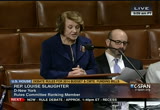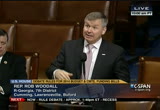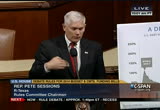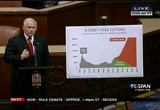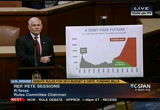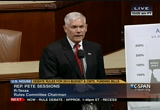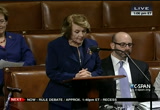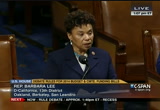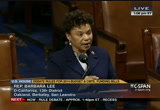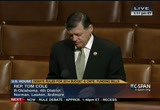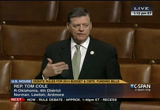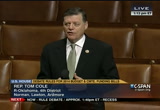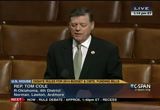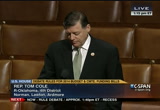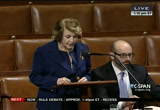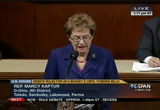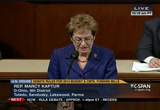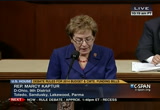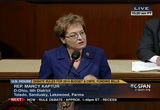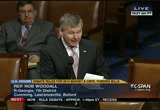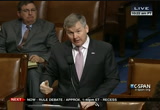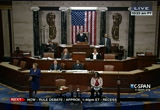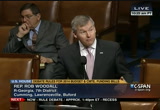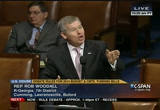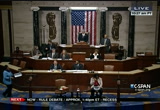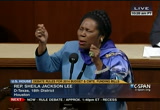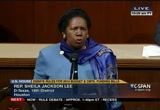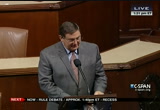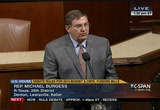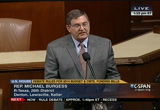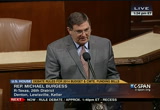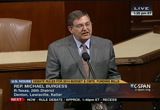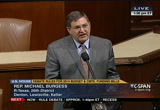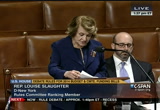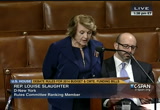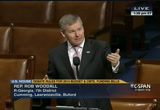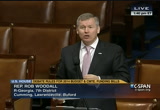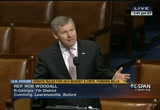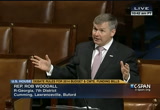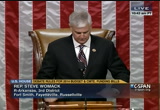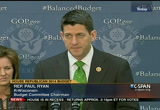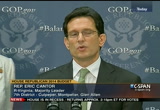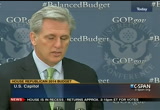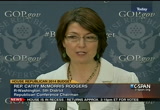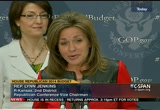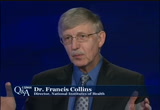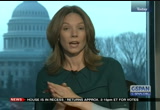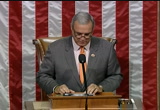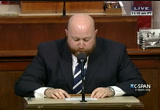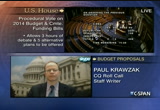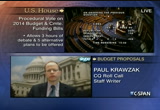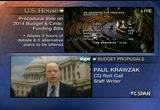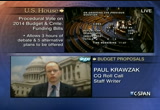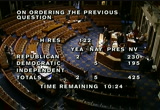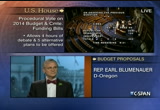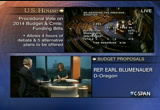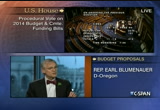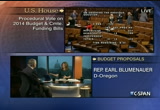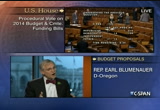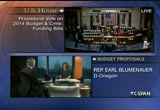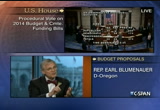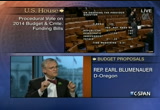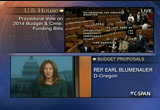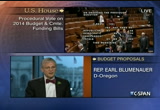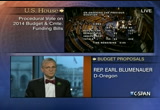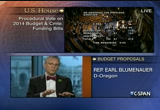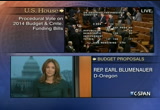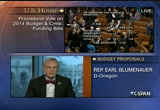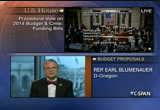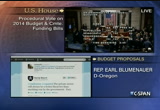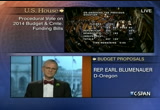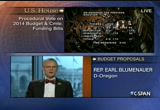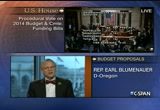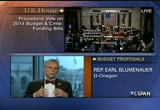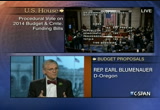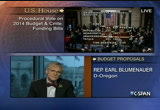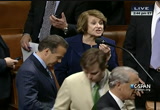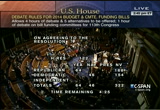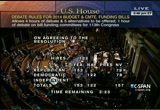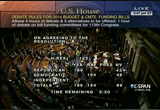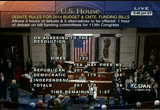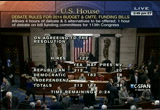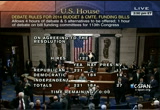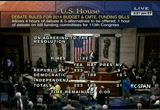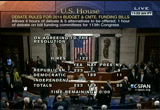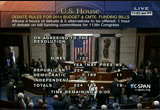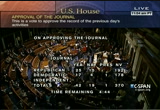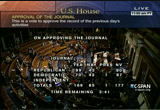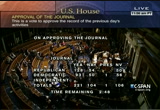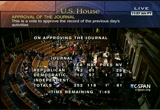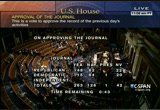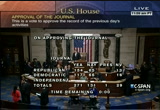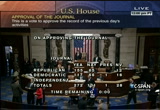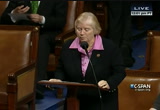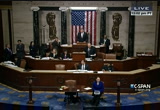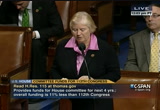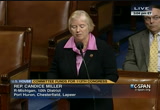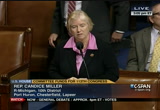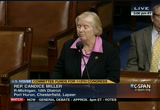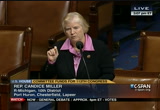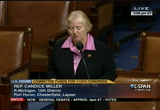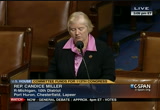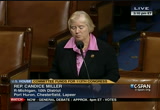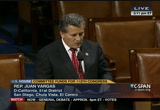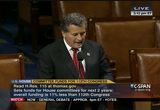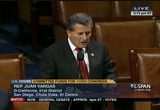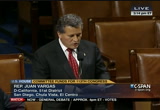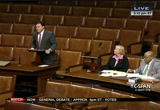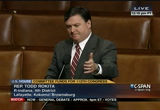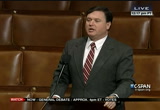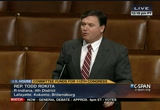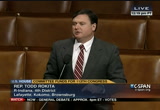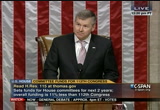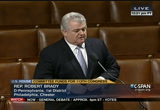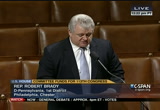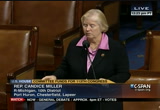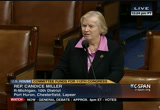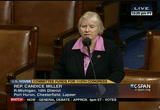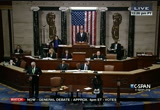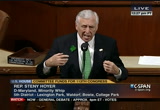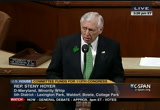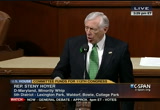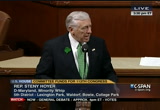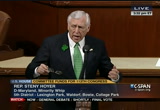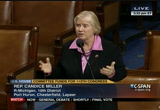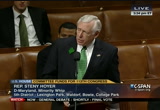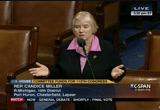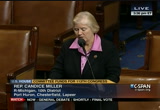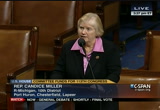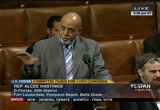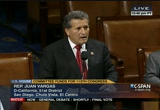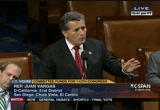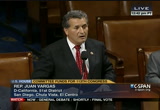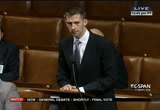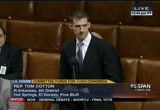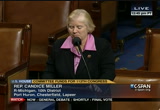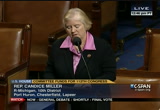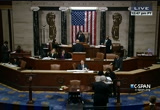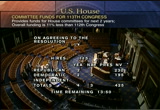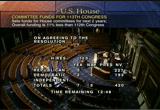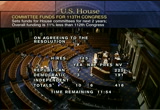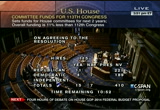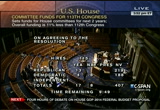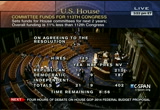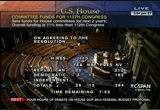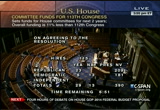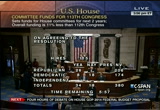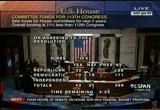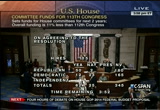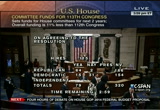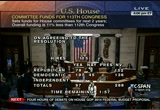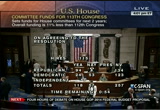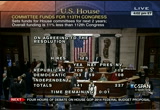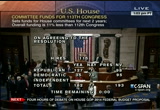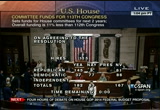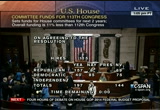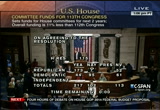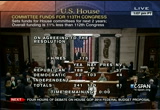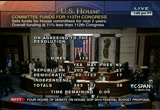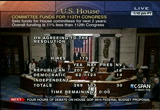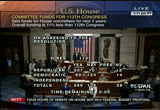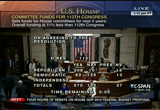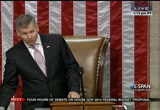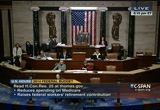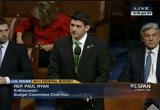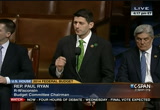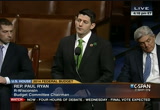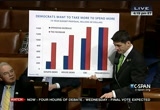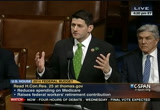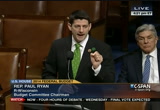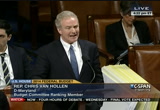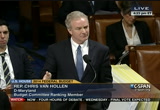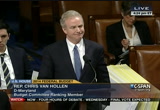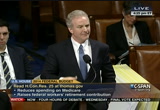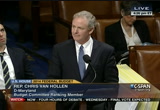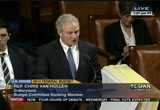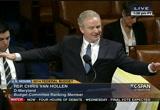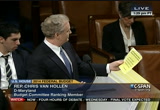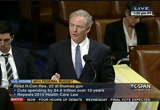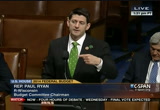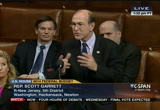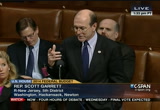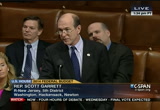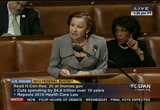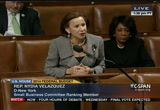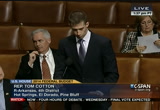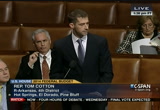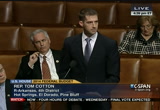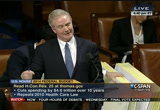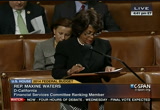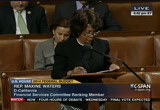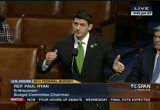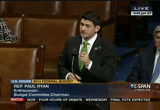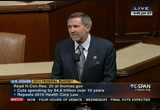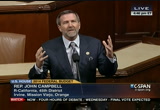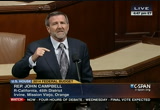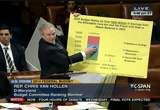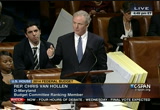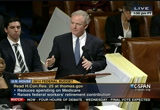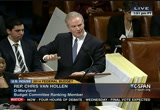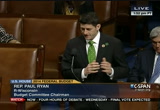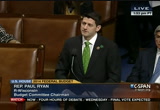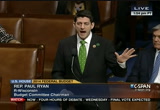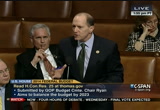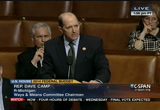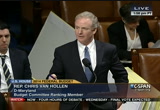tv Public Affairs CSPAN March 19, 2013 1:00pm-5:00pm EDT
1:00 pm
people. we've been down this road before and it is discouraging and dangerous that the majority insists we go down it yet once again. i strongly urge my colleagues to oppose the majority's budget proposal and today's rule and i reserve the balance of my time. the speaker pro tempore: the gentlelady's time is reserved. the gentleman from georgia. mr. woodall: i yield myself 30 seconds to refer the gentlelady to the house budget committee report. if she were to read just the first few pages she would say that -- see that spending increases thunder budget by $500 billion in the next five years and $1.5 trillion over the next 10. i promised myself i would count mum times we heard the word extreme cuts applied to what is a half trillion dollars in new and additional spending but i confess i have lost track already today. with that, i would like to yield five minutes, mr. speaker, to the chame of the rules committee, a man -- the chairman of the rules committee, a man who crafted this rule to allow all ideas on the budget to be considered today, the chairman from texas,
1:01 pm
the gentleman, mr. sessions. the speaker pro tempore: the gentleman is recognized for five minutes. . mr. sessions: thank you, mr. speaker. i want to thank the gentleman from georgia who sits on the rules committee and also sits on the budget committee and is doing an awesome job on behalf of this body and the people of georgia. today the american people have a chance really to see firsthand the rolling out of what we call the ryan budget. paul ryan as the chairman of our budget committee once again leads, i believe, the intellectual and thought process on talking about the future that we should have in this country. certainly the budget is that primer, that guiding post, that opportunity for us to lay out a philosophy about what republicans stand for, and today the american people are having a chance to hear from our colleagues, the democrats. of course as you listen to our colleagues, our friends, the democrats talk, everything about
1:02 pm
a budget is all about if you're a republican, us harming the middle class, us ruining the country, headed in the wrong direction. that is because they have taken the simple approach to they will try and fund everything. they will try and fund hospitals. they will fund airports. they will fund schools. they will do all these amazing things. and the facts of the case are is that that process and that future does not work. paul ryan yesterday, before the rules committee, very carefully, argued the point that really is embodied on this slide, which talks about a responsible way forward for this country. because, you see, we have the authority and the responsibility to make sure what we do sustains our future. is something that creates not only more jobs but opportunities
1:03 pm
for the future of not just ourself but our children and our grandchildren. for four years this house was led by democrats, and you can see the laws that they have passed and the amazing amount of spending that it would place upon our country. we don't even show in here individually where social security is that will go bankrupt. medicare, bankrupt. medicaid, insolvent. our inability to be able to pay or our future by creating jobs today. the free enterprise system is exactly what republicans support and believe in because that is the american dream. not government spending and government jobs. but rather a vibrant free enterprise system whereby there are employers who want to hire
1:04 pm
people to become employees to have careers, to then make this country better and stronger. the way you do that is by lowering government spending. by having a public-private partnership not by having the federal government be responsible for everything from a one-size-fits all health care industry to government control of every part of our lives. yesterday paul ryan very effectively, i believe, came before the house rules committee nd talked about a vision forward. what's very interesting is everybody else talked about let's just stick it to the rich. let's raise taxes trillions of dollars. let's go and stick it to special interests like people who he provide gasoline at the pump. to raise taxes on oil companies.
1:05 pm
ladies and gentlemen, every time you raise taxes, you raise prices. and every time you race -- raise prices the consumer has to pay more for it. these are the ideas that make america less able to be prepared for its future and cost more money. that's why when you look at this slide you see where the laws already enacted by the democrats are leading america to where we will be functionally bankrupt. we are following theure peaian model exactly what -- the european model exactly what they have done over there for a number of years and now we are seeing firsthand, iceland, greece, cyprus just yesterday. this is the pathway that if our friends, the democrats, get their say, this is where they'll lead us. so republicans through paul ryan spoke about we want to make sure
1:06 pm
that medicare, social security, that the free enterprise system is alive and well by making these plans and the process therein ready for the employers and the workers of tomorrow. that is what we are talking about. we are talking about reform that will ensure that the things that the american people want and need, and, yes, even national institute of health, that they will be prepared for our future. so, mr. speaker, this is what we are talking about today. i can't wait until paul ryan and republicans engage democrats on the floor with facts and figures. i yield back my time. the speaker pro tempore: the gentlelady from new york. ms. slaughter: mr. speaker, i'm delighted to yield three minutes to the gentlewoman from california, a member of the committee on the budget, ms. lee. the speaker pro tempore: the gentlelady is recognized for three minutes. ms. lee: thank you very much. let me thank the gentlelady for yielding and for her continued tremendous leadership on the rules committee. i rise in strong opposition to
1:07 pm
the rule and i think the previous speaker, chairman of the rules committee, really laid out why. i'm totally opposed to this rule and the bill. as a member of the budget committee let me just say i have had a chance to study this g.o.p. budget which is full of choice that is would undermine our nation's future, for the continued been fit of special interests, the wealthy, and, yes, big oil companies. oil subsidies. it creates more income inequality and shreds the safety net. it is in keeping with the overall effort we have seen over and over again to dismantle government, increase inequality, and leave the most vulnerable people on their own. we you should reject this very warped vision of america. and we should call this budget for what it is. republicans call it a path to prosperity. but it really is a path to poverty for the middle class, working families, for children, and for our seniors. mr. speaker, the majority did not support the amendment that i offered in budget committee to set a goal of cutting poverty in
1:08 pm
half in 10 years whichliesed and reaffirmed those government supported programs such as the earned income tax credit which lifts people out of poverty even though we tried to come to some agreement on language. quite frankly if they supported that goal, they would have accepted my amendment and their budget would have made some radically different choices. but the reality is we hear the rhetoric that claims to support a goal of ending poverty while at the same time making devastating cuts that put more people into poverty. the fact of the matter is you cannot pretend to fight poverty while you make brutal cuts to the very programs that lift millions of americans out of poverty. the republican budget would make devastating cuts that will increase child hunger, cut off millions of seniors from access to health care, and throw struggling families off of tanf during the middle of a job crisis. blocking medicaid, turning medicare into a voucher program,
1:09 pm
and gutting food assistance to our children and our seniors will not reduce poverty. it will just make it worse. and when you look at this republican budget, for example it takes 66% of the budget cuts from programs for people with low or moderate incomes. it would cost two million jobs in 2014, and it would slash $135 billion over 10 years by cutting eight million to nine million people from the snap program, our nutrition program, our food stamps program, which is one of the most effective anti-poverty programs in the united states. the miles per hour people deserve more. they deserve a budget that creates jobs. a budget that creates opportunity for all. not a budget that creates more poverty. i urge my colleagues to vote no on this rule and to vote no on this budget because it is a pathway to poverty. thank you. i yield the balance of my time.
1:10 pm
the speaker pro tempore: the gentleman from georgia. mr. woodall: mr. speaker, i yield myself one minute if i could just ask my colleague from california before she leaves, i have the great pleasure of serving with her on the budget committee. i would certainly disagree with most of her characterizations about the work product there. and look forward to dispelling those tomorrow. but today with this rule i heard you encourage our colleagues to re-- reject this rule. this is a rule that's made every single idea of every single member who had a budget plan in order. does that not satisfy the gentlelady's need for a full and open debate on our budget priorities? ms. lee: i don't think i mentioned a full and opened debate. what i wanted to talk about was the rule that allowed for the presentation of this budget and listing all of the support programs that really keep people out of poverty. and also the fact that, yes, we tried and you know in the committee, to put together an amendment that would actually do that on a bipartisan way, but you can't ignore the fact that
1:11 pm
we need snap. we need assistance to children, to women. we need all of those -- mr. woodall: i would not ignore those at all. i believe we have made priority of those in this budget. we'll argue that tomorrow. i'd like to yield at this time five minutes to another one of the gentlelady of my colleagues on the budget committee, the gentleman, mr. cole. the speaker pro tempore: the gentleman from oklahoma is recognized for five minutes. mr. cole: thank you, mr. speaker. i thank my friend for yielding. i have the privilege as mr. woodall mentioned of serving with him on the budget committee and serving with him on the rules committee, and being a fellow member of the republican study committee. i want to thank him for all he's done, quite frankly, to fashion both the ryan budget and r.s.c. budget and bring us such an excellent rule today. writing a budget in the end is always about making choices. fortunately this rule provides this house with multiple choices. a variety of options and a great
1:12 pm
deal of time for debate. i have an opportunity to debate the budget offered by our friends in the black caucus. we are going to have an opportunity to debate the progressive caucus' budget, the republican study commission budget, what we think will be the senate's budget, or at least as close to it as we can determine at this time. obviously our friends on the other side will present their substitute budget. and we'll have the underlying budget, so-called ryan budget, the republican budget. i think that's a lot of choices that this body is going to have to work through in the next couple of days. i'm proud this many rule allows that degree of choice and facilitates debate. personally i support both the republican study committee budget, and should it fail, or fail to achieve majority, the underlying ryan budget. both of them make tough choices. first and foremost to me they both come into balance.
1:13 pm
our republican study committee's budget, which my friend, mr. woodall, had worked more than any other member in crafting is a little tougher. comes in faster. i think that's a good thing. but the ryan budget also comes into balance within 10 years. that's important not just for the sake of bookkeeping, it's important because we all know that private sector growth depends on the confidence that taxes aren't going to continually go up and that the public sector will remain in check. i think by giving that kind of assurance, both of those budgets facilitate what i know all of us want, and that is the creation of more and better jobs for the american people. after all the budgets that never balance and record deficits, job creation, we would be coming off the four best years in modmodern american history, because we had four $1 trillion deficits in a row. another that will, quote, only be $850 billion this year. that's yielded us less than 2% growth a year.
1:14 pm
we all know if we took the number of americans that have left the work force and recalculated unemployment rate, it wouldn't be 7.8%, it would be about 10.5%. the path that my friends on the other side recommend doesn't work. and the balance in both the r.s.c. budget and ryan budget are much more promising course. they achieve that balance by not raising taxes, while not raising taxes. i think that's very important, too. we certainly aren't undertaxed in this country. my friends on the other side clearly believe that we are. they are going to offer multiple tax increases in all their budgets. i like the budget that does not require tax increases. finally, both these budgets, the republican study committee budget and the republican budget, come to grips with the reality that we have to -- reform entitlements. we have our own way of doing that, but there could be others. unfortunately our friends on the
1:15 pm
other side are largely silent about that important choice. as my friend, mr. woodall, mentioned in his remarks, the ryan budget, is hardly a radical budget. it's going to increase spending every single year over a 10-year wind heo by about 3.5%. the main democratic alternative is about 5%. can't we live at 3.5% and have a balanced budget in 10 years as opposed to go to five with higher taxes and not balance the budget within that 10-year window? again i'm proud of my democratic colleagues for joining in the debate. i appreciate the fact that they are going to put multiple budgets on the floor. i wish the president's budget were available. i'm going to assume someday it will be. it should have been here months ago, quite frankly, but sooner or later he'll get it in. in my view all the democratic budgets are unacceptable for
1:16 pm
one main reason -- for three main reasons, they all call for bigger goth, they all call for higher taxes, and most of them never, ever balance at all, not in 10 year, not in 20 years, so our friends are offer more expensive government, bigger government, and ever-expanding debt. i don't think that's the choice the mesh people want to make. i want to urge support of this excellent rule, it provides every member of the house an opportunity to participate in this important debate. i want to urge the passage of the republican study committee budget and failing that the underlying ryan or republican budget. with that, i yield back the balance of my time. the speaker pro tempore: the gentlelady from new york. ms. slaughter: i am pleased to yield three minutes to the gentlewoman from ohio, a member of the committee on appropriations, ms. kaptur. the speaker pro tempore: the gentlelady is recognized for teleminutes. ms. kaptur: i thank the ranking member for yielding me this time and rise in strong opposition to the rule ap the
1:17 pm
underlying bill that essentially is the ryan budget. i want to say to the prior speaker that the way you balance budgets is to put people back to work. this budget, the ryan budget, will actually cost 750,000 -- will cause 750,000 more people to be added to the ranks of the unemployee. when you have 12 people tissue 12 million people in our country whf been out of work for a long time, can't find a decent paying job you can't balance the budget with that level of unemployment. this is an anti-growth budget. i want to focus my remarks mainly on senior citizens aned the impact of this budget on seniors. the ryan budget turns a very cold heart to seniors. it ends the medicare guarantee and throws nearly 50 million americans receiving earned health care benefits through medicare to the cruel marketplace and rising health care prices and takes away the
1:18 pm
10-year guarantee of medicare solvency we passed in the air fordable care act. 41 million americans over the age of 65 will be affected an nine million disabled americans receiving social security benefits. that's the cold heart. now the poorest citizens in america are senior women over the age of 80 years. over half of medicare's beneficiaries earn annual incomes of less than $23,000. the republican ryan budget doesn't even see that. the ryan budget hurts the poorest seniors by putting senior farmers market nutrition coupons, for example, on the chopping block tosms qualify for $50 to buy fresh fruits and vegetables, a senior has to earn less than $15,000 a year. now you should that budget, 863,000 more seniors will be cut off of a fragile lifeline of ue coup upons for better nutrition. $50. the ryan budget already cut a
1:19 pm
million meals for fragile seniors across this country. now the ryan budget poors more harm on them. those who took our nation to the brink have earned record bonuses, millions and millions and millions of dollars. $50 for seniors or multibillions for those who have so much already? that's not even on the table. the ryan budget will cause more illness among seniors, seniors will be forced to pay thousands of dollars for medicines they can't afford. it will eliminate free screen frgs seniors for cancer and diabetes, kiel get more illness. it will eliminate free checkups for seniors who can't afford checkups and stop free mammograms and prostate screenings for them. the ryan budget will hurt them. it is bad for medicare. it is bad for seniors. it is bad for our country.
1:20 pm
ms. slaughter: i yield another minute. the speaker pro tempore: the gentlelady is recognized for an additional minute. ms. kaptur: i thank the gentleman. i urge my colleagues to join me in voting against this rule and the underlying budget. stand up for america's seniors. you know if you go to any food bank in this country, senior citizens are coming in at an increasing rate of 37%. just look at the lines. i ask everyone tissue every one of my republican colleagues when you go home this weekend, go to the food bank, look who is in line and ask yourself what you're going to do to fix the budget for our senior citizens across this country. stand up against the coldhearted republican budget. it's really the forces of darkness that work in here. open your eyes to what is happening across this country. vote against this rule and vote against the underlying budget. stand up for the seniors of america.
1:21 pm
in every family -- every family in this country has earned he right to have a worry-free existence. this budget hurts them. i urge my colleagues to vote against the ryan budget and vote against this rule. i yield back my remaining time to the gentlelady from new york ms. slaughter and i thank the membership for their courtesy. the speaker pro tempore: the gentleman from georgia. mr. woodall: i yield myself two minutes to address the forces of darkness. i found in my time that light is one of those great illuminators. i would just refer folks to the budget that's posted online. it's budget.house.gov, mr. speaker. as you know, the budget report is there that goes through line item by line item and increases spending not by the 5% that current law would do it. that current law that is sending our children and grandchildren to bankruptcy but creases spending by 3357b9%,
1:22 pm
the gentlelady from ohio is right, we have to make priority choices about where it is we want our dollars to go. i would say to the gentlelady and i know her heart is pure as she talks about the investment and where she wants to make it in this country, tell me what it is that you and i are willing to pay for today and let's make that investment. i think about hurricane sandy, for example, all those families in need we wanned to help and you know we didn't raise a single penny here to do it we asked our children and our grandchildren to pay for every nickel. i don't need encouragement to visit those food banks, i have been there already. i know what the gentlelady is talking about. ms. kaptur: then you've seen the senior women in the lines in all these food banks. mr. woodall: i have. and reclaiming my time, i have seen our neighbors there filling those needs as well.
1:23 pm
again it is so frustrating to me, in this body, we do not argument about who are the poorest and the neediest among us, we know with certainty, it's whether it's your and my obligation to feed an clothe those folks or whether we should pass that obligation along to our children and grandchildren. it is immoral. it is immoral for us to ask our children and grandchildren to pay bills for charity that you and i are not willing to do ourselves today. that this rule was made every idea on the floor of the house for a vote today but we must choose to co-it ourselves. the time for passing the bill to our children and grandchildren is long gone. i yield back the balance of my two minutes and reserve the remainder. the speaker pro tempore: the gentleman reserves. the gentlelady from new york. ms. slaughter: i'm pleased to yield another minute for the --
1:24 pm
to the gentlelady from ohio. ms. cap fur: i would say to the gentleman what you said was very, very important because we do have choices in a budget. and -- ms. kaptur: i would say to the gentleman that what you said was very important. we do have choices in the budget. at the food banks in this country, there isn't enough food being provided. they're at the edge. there isn't enough to go around. that's where the government of the united states has to come in. we can't ask our seniors to have any less meals, we can't ask our seniors to take any other nutrition cuts. it simply isn't fair. maybe you live in a community that's more affluent. i'm not sure. i represent three of the lowest income communities in this country and i see what's happening there. and you know if you look at the amount of subsidy going out to the producers in our country, we could nick that just a little bit and we could find the funds to help our seniors. i would invite you to ohio, i would invite you to see a state
1:25 pm
that still has 7% unemployment and what happens at the food banks. it's vitally important that we not cut senior citizens there isn't any loving child or grandchild in this country that wants to hurt their grandmother or mother or father and i think your budget is misguided and i would commend the gentleman, please look at those line rerks store the funds i'm asking for. i invite you to ohio. the speaker pro tempore: the gentlelady's time has expired. mr. woodall: i say to the gentlelady, my sister and brother-in-law and two beautiful nieces live in athens, ohio, twhoich poorestry jg -- regions in southern ohio, i know exactly what the gentlelady is saying. we do have to make these choices. and i commend our friends in the congressional black caucus udget and the other budget for raising -- for laying out their guidelines by raising taxes to pay for those priorities but
1:26 pm
even in those budgets they never balance. i'm saying that you and i today from the great wealth that is in this country today, have a chance to either pay for things that we think are important or borrow money from our children and grandchildren to pay for things we think are important. you and i are closer to death than birth. these bills are going to be paid by our children and our grandchildren and today, for example, the president's budget, we've never seen a budget that projected paying back even a penny. not in a 75-year window. i yield myself an additional 30 seconds. i would welcome the opportunity to work closer across the aisle but we are here today to address those needs we all agree on. i would say to the gentlelady, our disagreement is not on whether or not those needs exist. it's whether or not you and i are obligated, morally, spiritually, as a function of our community, to serve those
1:27 pm
needs, or whether we can pass that bill on to others. i know the gentlelady has a strong passion for doing it. i hope she would join with me so we could do it together. ms. kaptur: if the gentleman would yield, the first obligation is to feed the hungry. and i don't think the gentleman would want to have on his conscience any harm to the senior citizens of this country. i ask you to rereview your budget and fix it. i thank you very much. the speaker pro tempore: the gentleman's time has expired. does the gentleman continue to reserve? mr. woodall: i reserve. the speaker pro tempore: the gentlelady from new york. ms. sluggetter spm i'm pleased to yield two minutes to the gentlelady from texas. ms. jackson lee. the speaker pro tempore: the gentlelady is recognized. ms. jackson lee: i thank both of of my colleagues, i ask unanimous consent to address the house and revise and extend. the speaker pro tempore: without objection. ms. jackson lee: i thank the
1:28 pm
gentlelady and the manager of this rule and vigorously rise to oppose this rule, the underlying bill, the republican proposal for a budget. and i really do speak from the heart. when you go home it is often the best time of the service to your nation because you get to see hard working americans, no matter what reyou live in. so i'm very proud to associate myself in support -- and support the van hollen democratic budget substitute, the congressional black caucus and the congressional progressive caucus and the singular theme that rides through all these budgets, which is the very question that is raised by whether or not it's a teenager coming out looking for a summer job, whether or not it's a college student with their bruth new diploma, holing it up looking for america's great opportunity or whether it's someone who has worked for a period of time, well qualified but can't find the job to get back into the mark. i know there are those who are listening, my colleagues, who
1:29 pm
have constituents like that. every single budget, including the van hollen budget, the democratic budget, helps to create job, gets throifed sequester and in actuality, brings back the 775,000 or 750,000 jobs lost by the ryan budget plus more. the congressional black caucus focus og -- focuses on maintenance for public transport and highways, the congressional progressive caucus focuses on making work pay. but here's the story that i think is under the underlying ryan budget a good friend of ours,ing of, we work together and the underlying premise, i am tired of raising up the generational fight. just because the greatest generation fought in world war ii, are we to say to our children and fwrirn you know what, we don't want to burden you when the military calls you, when your nation needs you, we don't want to burden you there's no way to prompt what our grandchildren and children will have with this
1:30 pm
budget other than the fact that the democratic budget invests in people and when you invest in people an jobs and education -- ms. slaughter: i yield the gentlelady an additional minute. the speaker pro tempore: the gentlelady is recognized. ms. jackson lee: when off preschool program, when you have programs that transition women out of their homes after raising children into jobs, when off program that allows young people with a college degree to get a job, when you have programs that invest in infrastructure and build highways and bridges that america is begging for, like we built the hoover dam, then our grandchildren and children will receive an america that we invested in, they'll receive a fwift and they'll be able to work with their hands and their minds and they will have the ability to pay down any debt, they'll close any deficit, and they'll be grateful to do it because america will be the greatest nation that it condition. don't constantly pound us with our grandchildren and our children. right now, today, america can
1:31 pm
afford to pay for what we are doing in the van hollen democratic budget because we are creating jobs, we're building infrastructure, we're making america fwretter, the very america that people around the world admire. i want to vote far growth budget, i want to vote for one that reduces unemployment under 5%. i want to vote for one that lifts america so our children and grandchildren will have the benefit of all that we've done for them and they'll have the benefit of paying back on what america's promise is. vote for america's promise, vote against the ryan budget. the speaker pro tempore: the gentlelady's time has expired. the gentleman from georgia. mr. woodall thanksgiving it's my pleasure to yield time -- mr. woodall: it's my pleasure to yield time to the gentleman from texas, dr. burgess. five minutes, please. . the speaker pro tempore: the gentleman from texas virginia tech. mr. burgess: i thank the gentleman for leading this rule on the floor this afternoon. this is an important vote we are going to have today.
1:32 pm
the rule that will bring various budgets to the floor is a very fair product and as the gentleman knows, as we sat through the hours of debate in the rules committee last night, this is not just a product of the budget committee that is coming to the floor. this is not just chairman ryan's budget that is coming to the floor. these are budgets that have been proposed by a number of different groups within the congress, congress at black caucus, progressive caucus, democratic substitute. certainly the senate budget is going to be offered as a substitute where people can vote. republican study committee. at the end of all that time, if none of those budgets receive the majority vote in the house of representatives, then and only then will the product of the budget committee be voted on by the entire my expectation is that is the budget that will pass. my argument here today is not only what is contained within the budget committee's product
1:33 pm
any more than it is what's contained within the progressives' budget product. after all what we are voting on today is the rule that will allow us the ability to debate these differences in philosophy on the floor of this house tomorrow, on c-span, transparent for all the country to see. and they'll be able to see the big philosophical differences that exist. look, we heard in the rules committee last night that it's unfair to bring the senate's budget to the floor of the house for a vote because the senate budget has not been voted on on the floor of the house and that obstructionist republicans in the senate will keep the senate from voting. actually that's not true. the senate under its own rule can bring the budget to the floor of the senate and pass it with a simple majority. that's the 50 plus one majority. there is not enough republicans in the senate to block that or any other budget. so the discussion that it's unfair to bring the senate
1:34 pm
budget to the floor of the house to vote on before the senate has had a chance to vote, the senate could have voted on their budget at any time. the senate could have voted last year for bauth. the senate could have voted the year before for a budget. they chose not to because they did not want to put out for the american people to see what their core philosophical belief is, which you have to raise taxes by $1 trillion on the american people in order to pass the budget. we hear it time and time again the way to end poverty is to have a job. growth that is provided for in the budget that will be debated upon and i hope passed tomorrow, we can't discount the importance of growth. i just came from a hearing in the energy subcommittee of energy and commerce. we were fortunate enough to hear from the -- one of the members of the railroad commission in texas. the railroad commission doesn't have anything to do with trains any more, it has to do with energy. the commissioner from texas was
1:35 pm
at the committee hearing and i asked him a question, i said in the ryan budget that we will hear about tomorrow, there is an estimate of $11 billion over the next 10 years that will be paid to the federal government because of development of oil and natural gas on federal land. i said i'm from texas. that number seems a little bit light to me. i would expect the amount of revenue produced on federal lands from oil and gas production, assuming we don't legislate it out of existence through the environmental protection agency, he said in texas the two-year budget figure for oil and goes coverage taxes is $7 billion. well, that would be a significantly greater amount than the $11 billion estimated in the ryan budget. i asked mr. ryan about this last night at the rules committee. this is the amount that is allowed under congressional budget office expectations. but honestly if we free up the
1:36 pm
energy that we have available in our own -- within our own shores, within our own borders, that is a jobs program that would go a long way towards producing that unemployment rate of 5% that the gentlelady from texas just referenced. i know this because in the district i represent in north texas, oil and gas production from a geologic formation known as the barnett shale has yielded significant economic benefits and significant employment as a result. in fact, when the nation entered into a recession in december of 2007, constituents of my district basically read about it in the newspapers because it wasn't until 12, 13, 14 months later when the price of natural gas came down so low that we felt a recession in texas. let's utilize that energy that's at our disposal. life without energy is cold, brutal, and short. we have the ability to produce energy in our own shores and one
1:37 pm
of the things that i think we can look to the ryan budget for leadership is allowing that energy to be produced on federal lands. i thank the gentleman for the time. i yield back. the speaker pro tempore: the gentleman's time has expired. the gentlelady from new york. ms. slaughter: mr. speaker, i have no further requests for time. may i inquire from my colleague if he has further requests? mr. woodall: i do not have further requests. ms. slaughter: i'm prepared to close. thank you, mr. speaker. my democratic colleagues and i have spoken at length today about the dangerous shortcomings of the budget proposal of mr. ryan. fortunately representative chris van hollen, the ranking member of the budget committee, has an alternative proposal that significantly reduces the nation's deficit while creating jobs and protecting programs like medicaid and medicare. and unlike the majority's proposal, mr. ven's budget -- van hollen's budget repeals the sequester which is estimated to cost the nation 750,000 jobs this year. mr. van hollen has repeatedly tried to avert the sequester.
1:38 pm
he's come to the rules committee numerous times with proposals to replace the sequester with responsible budget cuts. and has been repeatedly denied the opportunity to have an up or down vote on the house floor. by voting for mr. van hollen's budget, every member of this chamber can vote to do away with the sequester. on behalf of the thousands of americans facing pay cuts, furloughs, and job losses, i urge my colleagues to repeal the sequester today and vote to balance the budget in a responsible way. mr. speaker, while the majority would like you to believe in a looming debt crisis is imminent. it is simply not true. even this last weekend both speaker boehner and the budget committee chairman paul ryan said on television, there is no immediate budget crisis facing our nation. please think of that, my colleagues, as you vote. in acknowledging this reality it is important to realize that it is possible to make investments
1:39 pm
in our economy today, create jobs, repeal the sequester, and still reduce our deficit in a responsible and laled way. -- and balanced way. in closing i urge my colleagues not to be scared by the rhetoric that sometimes we hear. instead, i urge my colleagues to support one of the multiple budget proposals that reduce our deficit responsibly while creating jobs today and protecting the important programs like medicaid and medicare for generations to come. i yield back the balance of my time. the speaker pro tempore: the gentlelady yields back her time. the gentleman from georgia. mr. woodall: thank you, mr. speaker. i yield myself such time as i may consume. i thank the gentlelady for being with me on the floor today. i'll say that we sometimes have some controversy in the rules committee, mr. speaker. there is a lot of responsibility that lies in the rules committee. with 435 folks here in this chamber. we all would like to have our say. we'd all like to have our say probably more than once. and the rules committee's tasked with managing that debate. i'll tell you i think the rule
1:40 pm
we passed last night is the best rule we have done all year long. my colleague from new york may think i'm damning it with fake praise, but i would say having this open debate that we will have tomorrow on budgets is about the best we can do in this institution, mr. speaker, to allow every single idea, every single individual from the most junior member just elected two months ago to the most senior member who has been here for 40 years, if you have a budget idea, you get to have it heard on the floor of the house. in this case, mr. speaker, that's going to be six buckets we are going to look at -- budgets we are going to look at tomorrow. six budgets. mr. speaker, i believe having an open process is important. we made in order the progressive caucus budget. that progressive caucus budget trillion.es by $5.7 unashamed, unabashed. tough economy, let's raise taxes by $5.7 trillion. and let's increase spending even more than we are today. i'm glad that that budget's going to be here on the floor.
1:41 pm
congressional black caucus raises taxes $4. trillion. mr. van hollen's substitute raises taxes $1.2 trillion. and you saw the chart the chairman of the rules committee had on the floor of the house here earlier. we don't have a tax problem, we have a spending problem in this country. if we took everything from everybody, we still wouldn't have enough money to pay for all the promises that previous congresses and previous presidents have made. and what that translates into is fear. we can do better for the american people, election after election torques scare women -- to scare them with the looming programs they depend on. yet we know those disability insurance program, already out of money, mr. speaker, the medicare program which my mom and dad depend, going out of business in 2023. the social security retirement program, mr. speaker, not enough money to fund future promises. we have a chance to either ignore those promises or embrace
1:42 pm
those challenges. i will tell you we do not have a crisis in this country. we have an opportunity in this country to do the things that we have long known we needed to do. in 1983, mr. speaker, republicans and democrats came together, extended the life of social security program, provided certainty and security for another generation of america's seniors. we have an opportunity tomorrow to do the same thing to the medicare program or to kick the can down the road and ensure uncertainty, crisis, fear in yet another generation of americans who depend upon these programs. i urge all my colleagues, mr. speaker, support this rule that will allow every single idea to be considered tomorrow. when you come to the floor tomorrow, choose that budget that makes the tough decisions.
1:43 pm
it takes no courage at all to let someone else pay the bills, mr. speaker. it takes no courage at all to let the next generation sort out the problems. the courage is coming together today to say even though the weight is going to fall on our shoulders to solve the problem, we owe it to the next generation, we owe them nothing less. with that, mr. speaker, i urge all my colleagues to support this rule. i yield back the balance of my time, and i move the previous question on the resolution. the speaker pro tempore: the question is on ordering the previous question on the resolution. so many as are in favor say aye. those opposed, no. in the opinion of the chair, the ayes have it. the gentlelady from new york. ms. slaughter: i request the yeas and nays. the speaker pro tempore: the yeas and nays are requested. those favoring a vote by the yeas and nays will rise. a sufficient number having arisen, the yeas and nays are ordered. pursuant to clause 8 of rule 20, further proceedings on this question are postponed. pursuant to clause 12-a of rule 1, the house will stand
1:45 pm
>> good morning, everybody. this is a good week for house republicans because this is a week where we bring to the country a responsible, balanced budget. the reason we are balancing our budget is because it is the necessary means to an end which is to improve people's lives. our balanced budget plan balances the budget without raising taxes. we are actually growing the economy. it promotes a -- it fosters a healthier, stronger economy so we can create more jobs. there is an op-ed in the "washington journal" today where two stanford economists say if this budget were enacted would grow the economy faster first year and last year. almost $1,400 would accrue to the household in the first year. $4,000 for the family in the last year of the budget. if we balance the budget by getting government to live within its means, that produces certainty. if we reform the tax code, open up our energy, get spending under control, reform our entitlements so people can count on the promises the government made, that helps the economy and improves people's lives. this stands in stark contrast to
1:46 pm
the budgets that the democrats are bringing forward. if there is one consistent theme you see with all the various budgets the democrats are bringing forward, including the senate budget i introduced by senator patty murray, it is this. it proposes even higher taxes. it proposes deep cuts to national security. more cuts to medicare. only to be outdone by even higher spending increases. the one thing we have seen from the democratic budgets here is $1 trillion in higher taxes or higher, only outdone by even higher spending than if we did nothing. taxing more, borrowing more, and spending more is not a path to prosperity. it is not going to give us the healthy economy. this is why we are proposing a responsible balanced budget. the only difference between the democrats and the republicans is in the butts we are passing, but at least we are bringing budgets forward. the president hasn't even proposed a budget yet. the law requires that the president of the united states submit his budget in the first
1:47 pm
monday in february and he is missing in action. that is not leadership. that is ducking responsibility. we are at least bringing our budgets to the floor showing the american people how we would govern. and we are showing here is the responsible path to a balanced budget which we think is far better than yet another tax increase and more spenged and borrowing which would evolve into a debt crisis. at least we are showing leadership. we would like to see some similar leadership come from other folks around town. with that i would like to introduce the speaker. >> i want to thank chairman ryan and members of our budget committee for a job well done. this is the first-yard line -- third year we have brought forward as a majority plan to balance the budget. this budget will balance in 10 years. for american families, a balanced budget means more jobs. it means more opportunities. it means affordable energy. and it also means a more secure retirement. listen, we balance the budget back in the mid 1990's along
1:48 pm
with president bill clinton. out of that plan we actually did balance a budget and led to one of the healthiest economies we have had. president obama should do likewise. work with the republicans in congress together to put forward a plan that will in fact balance a budget and help american families enjoy real prosperity and a much more secure retirement. >> good morning. this is a good week for house republicans. this is also a week of contrasts. years.get balances in 10 their budget never balances. and raises $1 worth of taxes. i think the question for the american people s. which budget actually helps? which helps people? well, i would say that a balanced budget is going to help grow our economy and provide the certainty needed that so many people out there looking for the government to do the very same thing they are having to do at
1:49 pm
home. which budget helps those who are in need? our budget provides a prescription to save the social safety nets of medicare, medicaid. theirs doesn't. theirs brings about the demise of those programs. which budget brings about the kind of tax reform that people want in this country? lower rates, fair and simpler tax code. our budget does that. theirs raises taxes to the tune of almost $1 trillion. the choice is clear. our budget is pro-growth. it will help people get back to work. it will help those in need. that's why we are going to have a great vote this week on the floor of the house. >> as i look out only one got the green tie memo. you're going to hear some of the same things from all of us because there is a direct
1:50 pm
contrast between where we are going and where the democrats are going. either you want more of tax and spend or you want a future that balances. the question is always why, one or the other? you go with the democrat tax and spend, you're going to get some of the same economy you have had right now. you're going to lose more of your paycheck, which every person working today has. if you go to the other path, the path to growth and prosperity, don't take our word for it. take the two economists sitting out at stanford. you may have heard of that university sitting out in california? they modeled it. they went out and said what would this budget do? they said by 2014 you'll have 1% of g.d.p. growth. that means $1,500 to every household. for out years you have 3 prers growth, meaning almost $4,000 to every household. so which future do you pick?
1:51 pm
growth or more tax and spend? if you don't agree with them, ask paul. >> the question is have you heard of that university called gonzaga from spokane? if you haven't you're going to. last week the president articulated his plan on the budget and he said, my goal is not to chase a balanced budget just for the sake of balance. we are not going to balance the budget in 10 years. and as has been mentioned this morning, our budget balances in 10 years. and that is important is because it's important in improving the lives of every person in this country and allowing them to keep more money in their pocketbooks. it also will help grow our economy, help create jobs. our plan is a plan to grow the economy. and what we are seeing on the other side from the senate by the democrat is a plan that's going to grow one thing, and
1:52 pm
that's the national debt. so at a time when many seniors are worried about their benefits, and we see many young people having trouble finding jobs after they graduate from college, ours is a plan that is going to give them the certainty and that is going to help them find those jobs because it's going to help grow the economy. what we need from the president and what we need from the senate democrats is a plan to join, to join us in this effort to -- that's going to help improve the lives of americans all across his country. >> a few c.p.a.'s in this town, you are going to be hard-pressed to find a bigger tax budget or economic geek than me. there's nothing i enjoy more than having a discussion about debt to equity ratios and 302-b allocations and the difference between getting to primary balance as opposed to actually alancing the budget.
1:53 pm
i have been told normal people don't enjoy those discussions. i can tell you one thing that normal people do have in common with me and that is i think they agree that the president is wrong when he thinks balancing the budget isn't a priority. they get it. they know that every family has to balance their budget. every business. every hospital, every school district, every state and local government has to balance their budget. and i think they are confused as to why the democrats' budget never achieves balance and why the president doesn't make it a priority. this affects real lives. it affects them based on the inflation rate when you got high debt ratios. it affects the cost of good and services, their gas prices go up, utility bills, food, clothing, health care. every family is affected by the inflation. investments are affected. my savings account isn't doing what it should be doing.
1:54 pm
our college saves -- savings plans, retirement saving plans, it scares small business. then there's this constant threat of a tax increase when you've got deficits. they have already gotten the trillion dollars from the health care bill, $620 billion on the millionaires and billionaires they campaigned on. now they are coming for the middle class. these are the folks that are going to be hardest hit by the next round of tax increases that are included in the democrats' budget. look, there's enough blame to go around in this town. when republicans had unfettered power in washington, they blew it. they didn't balance the budget the last time. certainly when democrats had unfettered power they have taken these deficits to all new heights. but i'm proud to be standing before you today with a group of republicans that are going to do what's right for the american people. balance a budget in 10 years by saving programs like medicare,
1:55 pm
social security, making responsible cuts without a tax increase. and that's going to grow the economy, put people back to work, and have a positive impact n american families. >> house republican leaders from earlier today. the house itself expected back around 2:15 or so for a couple of votes. one will include the rules for debate of the fiscal year 2014 budget resolution. and the five substitutes. also later today debate on the bill that sets house committee funding. we'll have live house coverage when they return here on c-span. today marks the 10th anniversary of the iraq war. here's part of what defense secretary hagel had to say about it in a statement released earlier from the pentagon.
1:56 pm
>> 34 years ago today, we began providing televised access to the everyday workings of congress and the federal government. the c-span networks, created by america's cable companies in 1979 and brought to you as a public service by your television provider. >> we could take pictures of the brain with m.r.i. scans or c.t. scans or pet scans and see the whole thing. there is this enormous gap in between about how the circuits in the brain function in order to be able to move my hand or to look at you and process that information, or lay out in memory. we don't know how that works.
1:57 pm
with technologies yet to be invented, a lot of this is going to be technology development, a lot of it will be nanotechnology, what we aim to do is be able to record from thousands, maybe hundreds of thousands of brain cells at the same time, be able therefore to underis stand how these circuits work. that's the brain activity map that's being talked about. very early days we don't really have a scientific plan about milestones and timetables and costs, but it's getting to be a very exciting moment to put something together that we couldn't have thought of. >> more with n.i.h. director dr. francis collins, sunday night at :00 on c-span's "q&a." off the floor of the u.s. senate report that democrats are dropping the assault weapons ban from their gun bill, making the approval of the bill -- ban unlikely. the c.q. congressional quarterly reports that senator dianne feinstein of california all but conceded today that the assault weapons banshee has spent months
1:58 pm
urging congress to renew will not become law. saying quote i very much regret it, i tried my best, but i guess my best wasn't good enough she told reporters before going to the weekly party lunches with senate democrats. on the senate side they'll being back this afternoon at 2:15. we expect the house to be back about the same time. until thin a conversation on female senators in the senate armed services committee and their impact on military polcy. -- policy. host: staff writer for "roll call" newspaper in washington. women changing the face of senate armed services panel. how so? guest: in the armed services committee, of the six subcommittees, three are chaired by women. in addition to the three subcommittees, they are chaired by women. two of the subcommittees have ranking members who are female. clearly a lot has been made about the fact we have a historic class of women in the senate, there are 20 female
1:59 pm
senators, which again as comparison to the rest of the population, is not so big, given the history of women in politics, is a pretty remarkable thing. but the other thing they are doing, they are not just coming to the senate. these are women who want to be involved and actively engaged. the armed services committee is a very active committee. no matter what the budget situation is in this town, this is the committee that has debates and consequential debates about our international policies. three women that i focused on in the piece with kyrsten gillibrand, the chairwoman of the subcommittee on personnel. kay hagan, the chairwoman of the subcommittee on emerging threats. and then shaheen who is the subcommittee chairwoman of readiness and preparedness. these are women who are now really inserting themselves in the debate. host: here's a list of all the women that serve on the senate armed services committee. deb fischer new republican from alaska, kay hagan, democrat from
2:00 pm
north carolina. gene shaheen. -- jean shaheen. the states they represent, what do they represent, hawaii, new york, new hampshire? guest: particularly with hawaii or new york, for example, they have significant amount of military bases, have budgetary and personal stake in what the military does. but i think what you hear when you talk to these women is they feel like they bring something a little bit different to the table. i was talking to kirsten gillibrand about the story and violence against women in the military and she said we have a bit of a different approach when before we were only talking about ar till rather and machines and -- ar tillary
2:01 pm
and machines and we say why is there such a high incidence of ptsd and divorce? you're seeing a much more holistic, i think they would say, approaches with these issues and you are seeing women talk about these softer issues. nothing is there something than a softer, more substantial conversation. host: and the hearing on sexual assault in the military, a little bit from it because we covered that hearing, want to show our viewers what the senator had to say. > i am extremely disturbed based on the last round of question and answer that each of you believe that the convening authority is what maintains discipline and order within your ranks. if that is your view, i don't know how you can say that having 19,000 sexual assaults and rape a year is discipline and order. i do not understand how you can
2:02 pm
say that of those 19,000 cases to only have approximately 2,400 even reported because the victims tell us that they are afraid to report because of retaliation and the blame they'll get and the scorn they will get from their colleagues is order and discipline. i really cannot understand how 2,400 cases only 240 of which go to trial can be resolved in you believe that that authority is giving you discipline and order. it is the exact opposite of discipline and order. and i'm very grateful for all of the changes that has been made. each of you gave opening testimony that was very strong and thoughtful about the kinds of changes you are making. and i appreciate that i heard from each of you that there is a zero tolerance. i appreciate that i hear from each of but the training you are giving your lawyers and the training that you are giving your prosecutors and the training that you are giving your advocates, and that is all well and good, but if the convening order is the only
2:03 pm
decision maker of whether a case goes to trial or -- and the only decision maker about whether to overturn a case, well, then, all that training and all those excellent lawyers and prosecutors you have don't mean a difference. it doesn't make a difference. host: the senator from new york and that exchange prompted this headline, "senator kirsten gillibrand ripped into top pentagon lawyers at senate subcommittee hearing." guest: the most interesting thing i found is the senate used to be the place where this conversation was completely absent. it was mostly happening in the house which i think you actually see a little bit in kirsten gillibrand who came from the house who was mediately put on the subcommittee by nancy pelosi. it's a subcommittee that deals with -- caucus, i should say -- that deals with vy license in the military in the house. in the senate you really didn't hear people talking about it.
2:04 pm
and so when the documentary "the invisible war" was made, if you remember then defense secretary leon panetta, when he was talking about changes in policy and reporting and dealing with sexual assault in the military, cited this documentary as one of the prime reasons that he was really like brought to knowledge of this issue. they tried to find senators to talk on the record so the camera for this movie and no one would. if you saw lawmakers it was only members of the house of representatives. so it's a really telling sign that you are finally seeing this had stuff talked about because it's clearly, as you saw in this clip, a significant issue. there are 19,000 cases of sexual violence in the military estimated by the department of defense. but the actual number that's reported or gets prosecuted is much, much smaller than that. host: what's next for this issue in particular? guest: so i think there will still be a series of hearings that they talked about. i think congress might try to weigh in in terms of trying to
2:05 pm
make it so there are more statutory rules that the military has to face. right now all of the rules that have been created are basically within the department. if you look at the defense authorization bills like they pass every year, that's a place where congress can issue guidance. they can't have directives that will force the military to change. they can do like the repeal of the don't-ask, don't-tell in the bill they certified the report that it's been found to make the findings permanent. so there are things they can do. host: in other issues that come before the armed services committee, how are female senators playing a role in terms of bipartisanship? guest: you know, i think they're certainly active. i think it's a bipartisan issue, the military. we were talking about kelly ayotte and how she's been
2:06 pm
involved. they are the three amigos, john mccain, lindsey graham and joe lieberman, when joe lieberman retired, they were in search of a third amiga and they found kelly ayotte, someone who is very articulate, who has a legal history and is obviously someone who's a tougher lawmaker who's really sort of latched on to these issues and made them her own. i don't know exactly what she's planning to do with that, but it's interesting to watch because it's automatically given her a platform on issues that clearly get talked about. i think that's one of the most important things about women being involved in this committee. we always talk about these issues. host: we're talking about the female senators that sit on the senate armed services committee, the impact it's having on military issues. here is kelly ayotte during the committee vote on the nomination of chuck hagel to become defense secretary. >> this nomination in a very different place. i very much agree with my colleague, senator reed, who is here as he describes the state of our country and our state of
2:07 pm
the national defense and the challenges we face around the world right now. it is a very, very difficult time and a dangerous time around the world. one of the first challenges we face and one of the greatest national security issues we face is the march of iran toward obtaining a nuclear weapon. i find myself in reviewing senator hagel's record and what he said when he appeared before us in a very lengthy committee to be very much at odds with him on this issue and i think also some of his prior positions are at odds with members of both sides of the aisle. host: mary, what about kelly ayotte's role and the whole nomination of chuck hagel? you've seen her out front on the issue. also what happened in benghazi, the attacks on the embassy. guest: this is where you saw
2:08 pm
republicans using as sort of their -- i don't even know what you'd call it -- you saw republicans being very vocal on these issues, whether it's benghazi or the nomination of chuck hagel which eventually passed not without consternation first. i think it's helpful for them to have a diversity of issues on this issue. not just john mccain or lindsey graham talking about this. it's something who obviously brings a different face to the republican message. although she's been very disciplined in what she portrays and the kind of message she takes. she hasn't diverged at all from what the republican conventions have been on these issues. host: we'll go to phone calls. mike in utah, independent caller, go ahead. caller: yeah. good morning. thanks for taking my call. host: good morning. caller: it is certainly a wonderful thing to see increased diversity of the panelists and the female
2:09 pm
senators. i was very interested last week to see the female senators questioning various representatives of the armed services relative to the sexual abuse situation in the u.s. military. and that is certainly a very relevant topic that concerns all of us. senator mccaskill talked about three seconds about the sexual abuse against males in the u.s. military and no other individual had brought that up besides her. she only talked about it for just a very few seconds. it's encouraging to see she has done that, and i certainly support her in her bravery to address that subject because i think sometimes in the scourse that we have, issues of abuse against males, both children and men, this is not strictly a military issue, but it's certainly true in the
2:10 pm
military, needs to be addressed due to the gender discrimination that exists against male victims of sexual abuse and how their cause has been explained and i would like for people to comment on that. believe me, i'm not anti-female, but i am pro these female senators recognizing that they do have male constituents who have problems. host: got it, mike. meredith. guest: i think you see women -- so claire mccaskill, i think some of her subcommittees fall in the homeland security domain. she's a former prosecutor. she's someone who sees these issues. when we talk about these violence issues, democrats have been careful for them not to be completely and narrowly tailered to women specifically. that's why you saw the violence against women act drag on for so long. the debate was protracted because there were increased
2:11 pm
protections for men who are in domestic relationships and being abused, whether straight or gay. and you are seeing more of an umbrella of these rights being expanded. mike is right. women's purposes is not just to champion the cause of women. i think some of the voices when we were talking about policy for service members, one of the things we haven't addressed is women will be in combat for the first time. and so this is something that men are going to have to talk about and women are going to have to talk about equally regardless of gender. host: that's the front page of "usa today." gender doesn't matter. taking a look at, of course, where very few women have trained and when they have in the past it's been so -- it's been done privately. for the nation the issue of allowing men into ground combat jobs such as infantry is a highly charged and revives well-worn arguments for and against change. not so here. far from the podiums and cable news shows where small number
2:12 pm
of women have been proving themselves physically capable for years. the women who serve on the senate armed services committee, those female senators, what are they saying about these issues? guest: i think they're sort of reserve in judgment. once there are issues -- because this is so new. because this was a decision that was made when former secretary of defense leon panetta was leaving office, they don't really know what the consequences will be. there is one interesting point that kirsten gillibrand makes, it's entirely possible that the present of women in combat will actually reduce the number of sexual assaults because there will be women involved in every element of the military and because their presence will become more commonplace. i don't know whether that's true and i think time will tell. i think you'll see this panel, whether it's the female senators or the male senators, really address and ask the tough questions. i think that's the other interesting to note about female senators. because they were kept out of these roles and these positions for so long, they tend to do their home work and they tend to ask questions. our caller, mike, pointed out
2:13 pm
that claire mccaskill pointed something out that no one else had. these are women that are coming prepared to ask the right questions but they don't know which questions they'll have asked yet. host: we are talking about female senators on the armed services committee and their impact on military policies. democrats, 202-585-3880. republicans 202-585-3881. and independents, all others, 02-585-3882. we'll go to tom next in texas, republican caller there. as tom is talking, want to go through the female house members on the house armed services committee. good morning, tom. caller: good morning, c-span. thanks for taking my call. when can we expect these militant feminists like obama or those in the senate to demand that all the women at west point meet the identical standards that the men are required to meet? as it stands now, the standards for the women are substantially lower. and if the women were required
2:14 pm
to meet the same standards, a majority of the women at west point, they would be expelled immediately for failure to meet that standard. now, i would expect all those militant feminists in the senate to demand they meet the same standards. when can we expect to see that happen? guest: so i'm not really familiar with the requirements of west point. but i do know as part of the conversation of allowing women to be in combat that they have to meet the same physical standards as men do. mean, this is -- this is like for everyone's safety that women carry out the same kind of physical tasks that men can. whether or not that leads to a larger percentage of women regardless of gender, it is very, very difficult to meet the kind of standards that are required for our military. i don't know that there's a higher percentage of women that will be able to meet those standards. but i do think because the opportunity is afforded to them, there will be more people who try. host: this is from "usa today," senior pentagon officials have
2:15 pm
said they will not lower physical standards as they open new fields to women. but some analysts and lawmakers worry that advocates might place pressure on the military to adjust standards if not enough women qualify for ground combat jobs. "they are going to face extreme pressure to lower standards," said congressman duncan hunter, republican of california, a member of the house armed services committee. women want senior leaders to hold fast if they do face pressure. they say they don't want the tab they earned to be cheapened by lower standards. also from "usa today" says this -- >> watch all of this in our advisio library at c-span.org. the house is gaveling back in for a series of votes. adopting house resolution 122, if ordered. and agreeing to the spomplee -- speaker's approval of the journal. the first electronic vote will
2:16 pm
be conducted as a 15-minute vote. remaining electronic votes will be conducted as five-minute votes. the unfinished business is on the vote on ordering the previous question on house resolution 122 on which the yeas and nays are ordered. the clerk will report the title of the resolution. the clerk: house calendar number 12. house resolution 122. resolution providing for consideration of the concurrent resolution, house concurrent resolution 25, establishing the budget for the united states government for fiscal year 2014 and setting forth appropriate budgetary levels for fiscal years 2015 through 2023. providing for consideration of the resolution, house resolution 115. providing for the expenses of certain committees of the house of representatives in the 113th congress, and for other purposes. the speaker pro tempore: the question is on ordering the previous question. members will record their votes by electronic device.
2:17 pm
this will be a 15-minute vote. [captioning made possible by the national captioning institute, inc., in cooperation with the united states house of representatives. any use of the closed-captioned coverage of the house proceedings for political or commercial purposes is expressly prohibited by the u.s. house of representatives.]
2:44 pm
the speaker pro tempore: on this vote the yeas are 223. the noes are 189. the previous question is ordered. the question is on adoption of the resolution. those in favor say aye. those opposed, no. in the opinion of the chair, the ayes have it. ms. slaughter: mr. speaker, on that i request the yeas and nays. the speaker pro tempore: the gentlelady from new york requests the yeas and nays. those in support of the request will rise. a sufficient number having arisen, the yeas and nays are ordered. members will record their votes by electronic device. this is a five-minute vote.
2:45 pm
2:53 pm
2:54 pm
without objection, a motion to reconsider is laid upon the table. pursuant to clause 8 of rule 20, the unfinished business is the question of agreeing to the speaker's approval of the journal on which the yeas and nays were ordered. the question is on agreeing to the speaker's approval of the journal. members will record their votes by electronic device. this is a 15-minute vote. [captioning made possible by the national captioning institute, inc., in cooperation with the united states house of representatives. any use of the closed-captioned coverage of the house proceedings for political or commercial purposes is expressly prohibited by the u.s. house of representatives.] the speaker pro tempore: this is a five-minute vote.
3:01 pm
the speaker pro tempore: on this vote, the yeas are 272, the nays are 133, with one voting present. the journal stands approved. for what purpose does the gentlewoman from michigan rise? >> on the direction of the committee on house administration, i send to the desk a privilege red port for filing under the rule. the speaker pro tempore: the clerk will report the title. the clerk: report to accompany house resolution 127, resolution dismissing the election contest relating to the office of representative
3:02 pm
from the 28th congressional district of texas. the speaker pro tempore: referred to the house calendar and ordered printed. he house will be in order. for what purpose does the gentlewoman from michigan rise? mrs. miller: i call up house resolution 127 and ask for its immediate consideration. the speaker pro tempore: clerk will report the resolution. the clerk: house calendar number 13, the election contest relating to the office of representative from the 28th congressional district of texas is dismissed. the speaker pro tempore: without objection, the resolution is agreed to and the motion to reconsider is laid on the table. mrs. miller: mr. speaker, i ask unanimous consent that members have five legislative kays to
3:03 pm
revise and extend their remarks on the resolution. the speaker pro tempore: without objection, so ordered. for what purpose does the gentlewoman from michigan seek recognition? mrs. miller: pursuant to the rule, i call up house resolution 115 and i ask for its immediate consideration in the house. the speaker pro tempore: the clerk will report the title of theres. collusion. the clerk: house calendar number 11, house resolution 115, resolution providing for the expenses of certain committees of the house of representatives in the 113th congress. the speaker pro tempore: the gentlewoman from michigan, mrs. miller, and the gentlewoman, ms. vargas, each will control 20 minutes. mrs. miller: i ask unanimous consent that all members have five legislative days to revise and extend their remarks. the speaker pro tempore: without objection, so ordered. the gentlelady will suspend.
3:04 pm
the chair would ask all members and staff to take all conversations from the floor. the chair would ask members on both sides of the aisle to take their conversations from the loor and take their seats. the gentlewoman from michigan will proceed. mrs. miller: thank you, mr. speaker. i yield myself such time as i might consume. the speaker pro tempore: the gentlelady is recognized. mrs. miller: i rise in very strong support of house resolution 115 providing for the expenses of certain demofse house of representatives for the 113th congress and which authorizes committee budgets for the 113th congress. earlier this month, mr. speaker, the committee on house administration held two very lengthy and very informative days of hearings with our chairman and ranking members from the 19 house committees. each of them testified about heir respective budgets, the commitment to uphold the long standing 2/3-one third allocation between majority and
3:05 pm
minority offices and most importantly they talked about doing more with less which is the topic we are all very, very familiar with. this funding process, these discussions, significantly impact the legislative process as these committees are aware, of course, the legislation that compromise much of our work begin with our vital oversight functions occur which is why throughout this process, we admered -- adhered, mr. speaker to two very important principles. first of all, we said living within our means. we need to live within our means. and prioritizing the finite resources we have provided in the congress by hardworking american taxpayers. as we know, sequestration went into effect on march 1, 2013, and congress must live with further cuts just as every other agency of government must live with similar cuts. as a result of the sequester, the total committee authorization level must be reduced by approximately 11% in the 11 per cren tile range. that means if we authorize
3:06 pm
above that amount we will have to take the money from somewhere else. and when ensuring that committees have adequate resources we have to consider their legislative objective. we have to consider their anticipated work load and authorize the finite resources available in a way that best suits the needs of the house of representatives. as a whole. andall though the sequestration is not certainly the ideal way to cut spending, cuts are imperative. they must happen. our government is too big, too involved, and too costly and as those who are charged with care of taxpayers' dollars we need to lead by example and we must control our spending. we must live within our own means. now this may be a far more strict budget than many had hoped for or anticipated but like so many americans we are coping with our circumstances and we are making cuts to our budgets in a way that any american business or american family would have to.
3:07 pm
as every local unit of government, every state around the country has had to do, certainly during these very trying economic times, we also have to make value judgments and budget accordingly. to match the available post-sequestration funding level, the total of authorization amount for house committees must be reduced, as i say, by about 11%. if the 2012 level. therefore, with very few exceptions, each committee authorization has been reduced again within that 11% range, or certainly within a percentage point or so of the 11%. based on the an pis tated work load for the 113th congress, the budget committee, the committee on ways and means and the select committee on intel have been given a slight reduction from the 11% but every committee certainly will be faced with important oversight responsibilities for 2013. however, given that getting our economy moving again and
3:08 pm
defending this nation are the foremost priorities we face, the dire need for tax and entitlement reform to help grow our economy, to create good-paying, private sector jobs and the increasing cyberthreats to our digital infrastructure, it was determined by our committee that these three committees certainly are the tip of the spear in doing some of the most important work for the american people. we must remain as well committed to lead big example in cutting government waste, rooting out inefficiencies and conducting essential and efficient oversifingt our vast administrative agent sis. house resolution 115, mr. speaker, we believe fulfills that mission. i would also point out that this house resolution not only reduces committee expenditures but authorizes total committee funding for the 113th congress at a level which is lower than 2005. i think that bears repeting. a level lower than 2005. by comparison, overall
3:09 pm
nondefense discretionary spending by the executive branch has actually increased 16.7% since 2008. quite a big difference there. and as i said before as chairman of the committee on house administration, i certainly understand the challenges of stretching committee resources and i have a very deep appreciation for every committee's ability to absorb these cuts and their commitment to functioning at a high level even with the reduced resources that they have and that's due certainly in no small measure to the outstanding leadership that we have with each committee chairman and each ranking member on all of our committees, really, all committed to delivering a high level of service to the american people. some of my colleagues i know have voiced their opposition to this measure, calling for a freeze in committee spending. they say that freezing spending for committees at 2012 levels is a more balanced air proach. but since sequestration, we
3:10 pm
just don't have the money to cover a freeze. we do not have the money. so i would simply state that spending beyond our means, in my opinion, is not a balanced approach. in fact i would say it's a bit irresponsible. as i said before, every american family, every small business, every state and local unit of government, must live within their means and so must the u.s. house of representatives. mr. speaker, again, this resolution has required taos make some very difficult but very necessary decisions and i want to personally thank an certainly all of our committee members thank each chairman and each ranking member who testified before our committee and our committee staffs as well who are often unrecognized for the vital work that they do. i would urge, mr. speaker, all of my colleagues to support house resolution 115, living within our means and prioritizing our finite resources like the rest of america. mr. speaker, i reserve the plns f my time.
3:11 pm
the speaker pro tempore: the gentlelady reserves. the gentleman is recognized. mr. vargas: i yield myself such time as i may consume. the speaker pro tempore: the gentleman is recognized. mr. vargas: house resolution 115 represents the next step in a slow march toward making house committees incapable of conducting the oversight with which they are charged and further limiting the power of this equal branch of government. mr. speaker, with these cuts, we are not talking about the loss of new equipment or the next computer or the printer, no. with these cuts we are talking about gutting our capacity to do the jobs we were sent here to do by the american people. the work product our committees -- of our committees is only as good as the talented men and omen that are ably employed. the house is lucky to have such well-seasoned and experienced individuals carrying out their
3:12 pm
business. this is one thing we always agrow on, the quality of people who work in these committees, they're at the highest level. but for how long? if this resolution passes, there will be a 21.3% reduction from committee since the 11th evening con. -- since the 111th congress. more appalling is the cut the judiciary will sustain at the same time marly as we look forward to addressing the comprehensive immigration reform we seem to agrow on now and the initiatives to reduce gun violence. as the chairman of the rules committee stated last week when he testified before our committee, he stated, we do not have something we can cut or manage on a moving forward basis. we have by and large taken ourselves down to the bare bones. now we're down to the bare bones. repeatedly we heard from committee chairs that the only thing they have left to cut are personnel expenses. veterans affairs chairman
3:13 pm
stated, quote, we have no choice but to find these savings in our personnel budget, end quote. and the chairman of the committee on foreign affairs said, we want to make certain that those individuals who make a sacrifice and come up here and work for reduced wage will stay with us. there is a question of how long and how deeply we can cut. of course there's a question. i think the question is before us. the chairs and ranking members of the house have been responsible stewards. we heard that already. and they have been. and they've achieved incredible savings. but this resolution's lack of fundings a -- funding also hurts our ability to find government-wide cost savings. in fact it does just the opposite. the committee's conduct -- committees conduct oversight over billions and billions of federal spending and have found avings within their respective areas. however, without high quality people with the institutional
3:14 pm
knowledge they sacrifice the ability to perform strong, responsible oversight. the chairman of the oversight and government reform committee illustrated this when testifying about the savings his auditors provided the government he stated cutting back for us, in fact, an opportunity to lose the very auditors that will guarantee you multiple savings. we would like to work with the committee to allow us and other committees to find similar savings but we must ask that you not allow the audit committee to be reduced when in fact we can return you more than 1,000 time ours budget, a it's d times, in mark only four times. members on both sides of the aisle have embraced the idea of doing more with less. we have grappled with the idea of not filling empty positions, denying requests for travel and foregoing necessary technology upgrades in our office but
3:15 pm
there's a point where additional cuts undermine the ability to do our job effectively. based upon the testimony that we received during the committee funding hearings, i believe that there is a bipartisan agreement that this funding resolution could represent that breaking point. in the end, the american people will be the ultimate victims. i urge my colleagues to defeat this resolution, i urge a no vote and i reserve the balance of my time. the speaker pro tempore: the gentleman from california reserves. the gentlelady from michigan. mrs. miller: thank you, mr. speaker. it's my pleasure at this time to yield as much time as he may consume to an outstanding member of the house administration committee, mr. rokita. the speaker pro tempore: the gentleman is recognized for such time as he may consume. mr. rokita: i thank the gentleman and thank the leader for yielding such time as i may consume. i rise in strong support of house resolution 115 but i appreciate the concerns just raised. and rhett me try to a-- and let me try to address some of them,
3:16 pm
if not all of them. there are victims in this country, for sure. but the real victimization will occur if this house, if this congress, if this president does not get ahold of the deficit and debt situation that we're incurring. right now we're in the middle of debating different budgets, the priorities that we have as parties, as americans, etc. on one hand we have a budget that balances within 10 years, radical for this town. on the other side, we have budgets that never ever balance . and if we don't get a hold of these deficits, if we don't get a hold of these deficits so we can finally start attacking the debt and if we continue to leave to future generations our bills, to me, mr. speaker, the most immoral thing i can think of, really, to do in civic life is to leave bills for future
3:17 pm
generations to pay, their will be the victimization. yes, we're going to have a hard time at the committee level and certainly with our m.r.a.'s that have been cut in the past to try to do our work, but what i heard in these committee hearings from our chairman and our ranking members each is that they pledge to continue their legislative and oversight activities despite these budget cuts. so there's not going to be any victimization here with this hution. the other thing this -- here with this house resolution. the other thing this house resolution does is lead by example, mr. speaker. how can we have a national family discussion, how can we have a discussion about the morality of leaving our bills for future generations to pay if we're not willing to suck some of it up ourselves? and yes, we're doing it. you know who else's doing it? the military. and i'd like to say here on the floor of the house that those
3:18 pm
excuses should now be taken off the table. we are leading by example and what we've cut through our m.r.a.'s already and this house resolution, and guess what, so has the military. now, let's finally get to a discussion and action, more importantly, regarding the real drivers of our debt -- the social entitlement programs of medicare, medicaid and social security. and, yes, many of our constituents will say, hey, wait a minute, don't call those social entitlement programs. we paid into those. therefore, we should get out. and that is true. but what is also true is that on average -- let's take medicare, for example, mr. speaker, we're paying in about 40% -- again, on average -- of what we're taking out. immoral. wrong to let that 60% go paid for for people who don't yet exist and therefore don't have a say in the matter. house resolution 115 let's us lead by example so that we can finally get to the rest of the
3:19 pm
conversation about the drivers of our debt. guess what else? the interest. we owe ourselves as private citizens. and more increasingly, other countries, like china, countries that don't necessarily have our best interests at heart, nor should they have our best interests at heart. we are paying more to them in interest because of this debt than we're spending on homeland security, education, roads combined. that breeds weakness. that fosters instability. that creates victimization. house resolution 115 will give us the moral authority and the real authority for having this discussion to lead by example which is also well needed in this country at this time. the fact of the matter is we shouldn't have to oversight the budgets of the executive branch. it's -- if this executive
3:20 pm
branch and this president would rein in his own people, rein in his own organizations, create a culture of doing more with less. as has been famously stated by a former governor of indiana, people will never remember -- or never miss the government that's been cut. now, it goes without saying, individualism, people can do more for themselves, people can do more for each other than a farahway government program can. let's continue to lead by example. let's continue this fiscal fight that we're engaged in. let's pass, let's strongly support house resolution 115. and i yield back. the speaker pro tempore: the gentleman yields back. the gentlelady from michigan reserves. the gentleman from california. mr. vargas: thank you very much, mr. speaker. mr. speaker, i yield the gentleman from pennsylvania, the ranking member of the committee on house administration, mr. brady, as much time as he may consume. the speaker pro tempore: the gentleman from pennsylvania is recognized for such time as he may consume. mr. brady: thank you, mr.
3:21 pm
chairman. i thank the gentleman for his yielding and for his work on the committee. i'm pleased -- i'm pleased he's managing this bill today. it's good for the next generation of members to learn the procedures of the floor this way, put them right in the line of fire. i'd also like to thank the chairman for how she handled our marathon of hearings. juggling the schedules of our chairmen and ranking members. i also rise in opposing this resolution. we have cut committee funding for the last three years. we are past a point of cutting what we want, and we are now cutting what we need. our ability will track and retain expert staff. i ask the same question every ranking member and every chairman that came in front of us. i asked whether or not they have -- they thought in their own mind it would hurt them and the job they can do and the job they do for the american people on those committees. and everyone to the manner of the woman said it -- it would
3:22 pm
be an issue for them, that they would have a problem, not only we cut in 2012 and gave people a position at a lower salary, these people that could without question double, triple, four times the money out in the public sector -- private sector but they -- i ask them and their main concern was keeping, keeping people on their staff with constitutional knowledge. people that had the knowledge of how this house works. as you all know when you first get here it can be a quad meyer, you don't understand -- quagmire, you don't understand what's happening. these people know it. they keep this train running. and to hurt them and not be able to retain them would be a major, major disservice. just the constitutional knowledge that they have. again -- stoonl knowledge that they have. -- institutional knowledge that they have. i understand we have to cut some other people. we cut these staff members, the people that have been here and ry to atrack other people to
3:23 pm
do the job these people do, i think it will be hurting the american people. i think we need to defeat this resolution and give the funding that they need to work. i thank the gentleman for yielding to me and i yield back the balance of my time. the speaker pro tempore: the gentleman from pennsylvania yields back. the gentleman from california reserves. the gentlelady from michigan. mrs. miller: mr. speaker, the fact of the matter is this is all the money we have to spend. and believe me i am sympathetic to the arguments that it would be nice if our committees didn't have to make any cuts. again, if we don't make some cuts, because of sequestration, this money has to come from somewhere else. you know, i guess we're sort of looking for other ideas for offsets for those that are saying we should not pass this resolution. what kinds of things would they offset? you know, we certainly watch the white house close tours to
3:24 pm
groups because they said the sequester impacted the secret service's ability to protect the president when the american people came into the white house. i don't know if they suggest we close the capitol building or what have you. i don't think that suggestion would go very far. where would you offset if you don't cut any spending here? i would also say this. i come from southeast michigan that arguably was ground zero during the most painful economic transition, certainly in my lifetime, that happened in our nation here recently as we're trying to get ourselves out of that. we were number one in all the categories you didn't want to be number one in. and if i would have told our county, our local county or our local unit cut by 11%, they would say thank you. because they have cut anywhere from 30% to 40%. just incredible amounts of cuts that happened. furloughs that happened with employees. that's been going on for years actually. that's our neighborhood.
3:25 pm
that's my neighborhood, i should say. when we think about the amount of borrowing that we're doing as a nation, as everybody knows, we are now to the point with $16 trillion in debt, national debt and no end in sight, when we are running deficits for the last -- certainly for the last five years well over $1 trillion and many cases $1.5 trillion annually, when we're borrowing 42 cents on every dollar we spend, if we do not have the political will to make any kind of cuts ourselves while these kinds of cuts are -- while these kinds of cuts are being absorbed by other areas, we can't even cut our own committee budgets here in the house, i just think this resolution will be a very vivid demonstration of the differences of what we think leading by example actually means. and i will tell you as well as a grandmother i do not want to look at my two little grandchildren and say, hey, you mind paying the bill, because i don't have the political will? i just can't do it.
3:26 pm
too hard for me. would you mind? i don't want to break a sweat here, would you mind paying? i'm going to tell you, mr. speaker, i just cannot get to this place. i think this resolution is very, very important. recognize the painful cuts that are happening, it's not easy. it's not easy. that's why the american people sent us here, to have the political will and to make the hard decisions and i will hope that my colleagues would support this resolution. i would reserve the balance of my time. the speaker pro tempore: the gentlelady from michigan reserves. the gentleman from california. mr. vargas: thank you very much, mr. speaker. mr. speaker, i yield the gentleman from maryland, the democratic whip and former ranking member on the committee of house administration, mr. hoyer, five minutes. the speaker pro tempore: the gentleman from maryland is recognized for five minutes. mr. hoyer: i thank the gentleman for yielding and ask unanimous consent to revise and extend. the speaker pro tempore: without objection. mr. hoyer: let me say at the outset, i heard the gentlelady from michigan's comments. i have three grandchildren of my own and two great grandchildren. and the gentlelady said we don't want to turn to them and say, we don't want to pay our
3:27 pm
bills. you pay them. that's what we did in 2001 and 2003. we cut revenues. we cut revenues deeply. we didn't cut spending. we increased spending. on the theory that the people who were going to get the benefit were voting and the people that were going to pay would pay the bill weren't voting. it worked. to some degree. but what it also did, because we didn't pay, as the gentlelady suggested we ought to, our bills, we had, as the gentlelady probably knows, a provision in place which said we ought to pay as we go. if we buy a war we ought to pay for it. if we buy a tax cut, we ought to pay for it. if we buy prescription drugs, we ought to pay for it and not ask my children or my grandchildren or your children or your grandchildren to pay for it. i agree with the lady. but that's what we've done. and now we're about the process of undermining the people's
3:28 pm
government by slashing its funding so it cannot provide the services that the people ant and need and vote for. and now we will slash the ability of this house to do what the people expect us to do. i'm sorry. the former secretary of state left the chamber. he's the secretary of state. he says we ought to lead by example. my god. i tell you people in my constituency, they hope we're not the example of how to work. they hope we're not the example of dysfunction that they ought to follow, that we're not the example of do it my way or no way which is what we've been doing. people of the united states of america send us here and they want us to make sure that we adopt policies that will help them, their families create jobs and grow our economy. that's what they want, and what the people of the united states also want is they want to make
3:29 pm
sure we can conduct oversight of their government. that's our responsibility. the previous gentleman said, executive ought to lead and then we wouldn't need to do oversight. i didn't get that, frankly, at all. the executive is a separate and equal branch of government, but we are the first branch of government. we're article 1. we're the people's house. we represent the people, and they expect us to make sure their government is operating properly. and to the extent that year after year we reduce our ability to conduct the oversight necessary to ensure the people's government is operating consistent with law and on behalf of the people of the united states, to the extent that we undermine that mine free under government, a free country, a
3:30 pm
free people. we undermine this government's ability to making sure that the executive is doing the right thing and to the extent the population keeps growing, as it does every year, it needs us to e on the job. what we have of course is sequester. sequester starts with s, it stands for stupid. it is an irrational policy we have adopted. and we've adopted it. it just didn't happen, it didn't come out they have air, it didn't fall from the tree well, adopted sequester. it's an irrational, ineffective, inefficient, negative policy. that we've not only allowed to go into place but in the budget we passed, we adopted it one more time. not by mistake but by policy.
3:31 pm
it was a bad policy. i didn't vote for it. it's a bad -- it's irrational. i tell people around the country, you know, it's like the family has a budget. you have a food budget, off movie budget and somebody loses their job so your income goes down and so what you do is sit around the table and say, we'll cut food by 10% and movies by 10%. what rational human being would do that? nobody. they would say, we're not going to go to the movie this is month. so we can put food on the table and make sure our family is well fed. but that's not what we're doing. the sequester that we're now pursuing somewhat mindlessly in my opinion, with respect to our ability to do the job that the people expect us to do, is to cut food by 10% and movies by 10%. my friends, i rise in opposition. may i have one additional minute? the speaker pro tempore: the
3:32 pm
gentleman is recognized for one additional minute. mr. hoyer: i have one other opposition that measure. we have cut deme funding for two years in a row. we are asking everyone to notch in their belt one notch or two notches and we ought to do the same, and we have. but if you undermine the people's ability to do its job, your going to be in trouble. woodrow wilson once wrote congress in session congress on public exhibition. that's what we are here. we're on public exhibition. tv's on, mr. speaker, people are watching us, people are seeing us. but what woodrow wilson said, while congress in committee rooms is congress at work. that's where we really do our work. we vote on it here, but committees are critically important creatures of oversight and of action. i think the gentlelady is a
3:33 pm
good member of this house and she's been gaven tough responsibility, she laments the fact that we have no money. we have no money because we said we didn't need it fwosme money because we can operate money without it. mr. speaker, i hear your gavel and i will close. but i urge my colleagues to vote against this resolution. let's make sure the congress of the united states can do the job the people expect. i yield back my time. the speaker pro tempore: the gentleman yield back, the entlelady from michigan. mrs. miller: i appreciate the gentleman's comments, i have great regard for him as well. i hearing him talking about the sequester, an irrational kind of thing thembings president's idea, i don't dispute it's not the best way to cut spending, many may say it's aner rational approach, the president's
3:34 pm
sequester, the president's idea. mr. hoyer: would my friend yield on that issue? mrs. miller: certainly, i would yield. mr. hoyer: just so we're accurate, your side offered a bill called cut, cap, and balance. the alternative was sequester. i didn't vote for that. i don't want to -- i'm not sure how the gentlelady voted on it, it passed this house overwhelmingly with republican support and opposition on our it was suggested to harry reid that that might be one way to get off the lack of action on making sure america pays its bills. the only reason i interrupt the gentlelady, i think it's important to understand your cut, cap, and balance passed before that suggestion was made included sequester as the fall back if we didn't reach the numbers. i think if it's the president's
3:35 pm
-- it's the president's via cut, cap, an balance which your side of the aisle passed and sent to the senate as presumably good policy. i thank the gentlelady for yielding, she was kind to do that. mrs. miller: i thank the gentleman for pointing out the sequencing of the sequester, the president's sequester, and i still say with the president's sequester, what's going to happen with this vote is a vivid nonstration of who is actually committed to doing more with less. my colleague, the gentleman, the minority whip, had also given a sort of historical lesson of various things under, in his observation of the way things had gone earlier on and i would point something out as well, since we are talking about actually committee budget cuts. in 2007, when the other party, the democrats, took control of this house, they immediately increased the amount of spending on committees by 8.9%,
3:36 pm
almost 9%. immediate increase. then in 2009, as they kept control of the congress they increased committee spending, that time again by 8 ppt 9%. -- 8.9%. this was at a time, i mentioned previously, being from southeast michigan, everybody else, certainly every state government, every local unit of government, every school district, many, many businesses, certainly american families, were making cuts. were making cuts. that was not happening here with committee spending. and you know in 2010, this house shifted control, the republicans took control what did we do with committee spending as a way to show we wanted to do more withless, that we understood that we need to get a handle on this out of control sp federal spend, we cut committee budgets by 9.5% in the 112th congress and again as we're debating now another 11% cut we're looking at, this is at the same time the house
3:37 pm
under republican control has also cut what we call our members' representational allowances, m.r.a.'s, which has been painful for all of us as well we cut 5%, then in the 6 percentile just a few weeks ago, with the sequester another in the eight percentile cut for all of us. all of us are doing more with less. there's no sympathy for members of congress but i point that at. -- out. if you look at nondiscretionary the executive brampling, almost 17% increase during that time. we look at the resolution seeing how important it is, i'm not minimizing how painful it will be for the committees but it's the new reality, i think, and important for those of us here in the people's house the people's work. i know certainly republicans
3:38 pm
and democrats are committed to doing that and with that i i reserve the balance of my time. the speaker pro tempore: the gentlelady reserves. the gentleman from california. mr. vargas: i yield the representative from florida one minute. the speaker pro tempore: the gentleman from florida is recognized for one minute. : -- enshaw mr. hastings: i have learned you can be penny wise and pound foolish. for a protracted period of time we have not been able to retain the kind of staff, the hardworking people that do the grinding work in committees as mr. highwayerer pointed out and we leave them without the ability to get a raise and i don't know about you all but what's going to wind up happening with my staff is some of them are going to get better jobs because they are better served by going into the private sector. if we want to retain good
3:39 pm
people, then we have to pay good people. and at a time when the public is more aware of what we are doing and making more demands as rightly they should upon us, we decide to put ourselveses in a position to not be able to serve the public. in the final analysis, some of what we're doing is tiing to save our republican colleagues, they get 2/3 of whatever it is we're talking about. but we should not be ashamed of what we do here. we deserve the honesty that we would want the american public to expect of us as we conduct our work. the speaker pro tempore: the gentleman yields back. the gentleman from california reserves. the gentlelady from michigan. mrs. miller: i reserve. the speaker pro tempore: the gentleman from california. mr. vargas: thank you very much, mr. speaker. mr. speaker, first of all, i'd like to thank the chairwoman from the committee, she has been very gracious in committee
3:40 pm
and i've learned quite a bit from her. i particularly want to thank the ranking member, who gave me the opportunity to speak here, that doesn't normally happen for freshmen. he has a reputation of being gracious and kind. i appreciate it. it was certainly demonstrated here today. i do have to respond, however, there was the issue of immorality that was brought up earlier, as a former jesuit i'm comfortable with that type of language, i believe it was said that leaving bills for other generations, future generations, was the most immoral thing we could do. certainly i'd challenge that premise, i think there's a lot more immoral things we could do. however when you look at the issue of immorality and say we're going to leave this huge deficit this huge debt, to future generations, i think that that is immoral. however, it's interesting the argument on the other side is just simply the argument of cuts. and not revenue. so for example, corporate jets, there are loopholes for them now.
3:41 pm
we could close them. it wouldn't hurt the millionaires and billionaires to pay taxes on them. it wouldn't hurt them one bit. that of course would cut, it would cut the debt, the deficit we leave for future generations. reducing the immorality. we could have the wealthy instead of paying 12% or 13%, on average, pay what middle class people pay. that certainly would cut the debt an receive did -- deficit significantly, redeucing, once again, the immorality. but it's interesting, talking about immorality, the pible certainly speaks to that. in amos, the prophet amos if you look it up, you'll see that amos speaks about god's little ones, the little ones then were the orphans and widows because of the condition we're in. it was very difficult for them to survive. we then, or at that time, the israeliites, were going to be judged on how they treated
3:42 pm
these people. that carries forward into the new testament if you look in matthew, matthew 25, how are we going to be judged? how are we going to be jummed? jesus makes it easy he says, whatever you do to the least of my brothers, you did to me. he goes through a litany of things. he said, when i was hungry you gave me to eat. when i was thirsty, you gave me to drink. when i was stranger, interestingly, when i was a stranger, we're certainly have that conversation with immigrants today, when i was stranger you welcomed me. when i was ill you cured me. interestingly i -- interestingly, too, when i was a prisoner you came and visited me, didn't say if you were innocent, by the way, just when i was prisoner you visited me. that's how we'll be judged. these budgets should go to those values, that's what's moral, taking care of those who are thirsty and hungry and
3:43 pm
taking care of strangers. these committees work hard to make sure that happens. they do a good job. no one has argued that they don't. just the opposite. what we have heard from committee chairs is don't cut us because we can do a better job. not only that you're loading the work on us. so i would conclude and again, thank the ranking member and certainly thank the chair for the opportunity, and i would urge my colleagues to defeat this resolution and i appreciate the opportunity, again. the speaker pro tempore: the gentleman yields back. the gentlelady from michigan is recognized. mrs. miller: it's my pleasure to yield two minutes to the gentleman from arkansas, mr. cotton. the speaker pro tempore: the gentleman is recognized for two minutes. mr. cotton: listening to this debate, it's primarily about the amount of money we spend on committee here's in the house. taxes have just been inserted into it. i have to respond to the comment about corporate taxes or tax breaks for comp rat jets. an easy target, something the
3:44 pm
democrats have repeatedly targeted in their budget resolutions, something the president proposed to offset sequestration. of course the wealthy with their big, fancy corporate jets, corporate executives with their jets, are easy targets. but there's a lot of collateral damage any time this issue comes up. we forget about the people who fly those planes, the people who clean the plane the people who fuel the plane the people who run the fa tillcy -- facilities where those planes are hangarred neerge who manage flight operation, the people who manufacture the plane which is i would point out, the number one export industry in the state of arkansas. much like in 1990 when he budget deal targeted the yacht industry in new england for a special luxury tax, didn't raise the revenue that was projected, it devastated that industry, leading to catastrophic layoffs and resulted in the repeal of that measure within a matter of months after it was passed. while i appreciate the
3:45 pm
democrats' desire to raise taxes every few months, i think that our spending crisis, our our -- or our debt crisis is driven by spending and we should be careful about singling out industries that provide good, high-paying jobs to hardworking americans. i yield back. the speaker pro tempore: the gentlelady from michigan. mrs. miller: thank you, mr. speaker. i want to thank mr. vargas for controlling his time, mr. speaker, he did a very good job. we certainly welcome him to the committee and look forward to working with him as we also thank the ranking member, mr. brady, for his extraordinary work on behalf of the committee and we look forward to continuing to work with him. obviously we have a bit of a disagreement, mr. speaker, on the committee budget cuts here but i certainly would also applaud the work of all of our chairmen of our committees as well as all the ranking members who very diligently went through their budgets, trying to make the appropriate cuts
3:46 pm
and will continue to do that now, when this resolution is certainly passed as we go forward. i think for all of us, really trying to create a fiscally responsible level of funding -- funding here. something that is -- that allocates resources in the very best way we can, that allow this is house to complete its work on behalf of the american people. again, mr. speaker, i would say i believe that we are leading by example with this resolution today and we need to show that the important work of government can certainly be done and we can do it well. with less. doing more with less. at the very -- that's a very well-used terp but an appropriate one for this, during times of tight budgets. i urge all my colleagues to support this resolution and yield back the balance of my time. the speaker pro tempore: the gentlelady yields back. all time has expired. pursuant to house resolution 122, the previous question is ordered on the resolution.
3:47 pm
the question is on the adoption of the resolution, those in favor say aye. those opposed, no. in the opinion of the chair, he noes have it. mr. vargas: mr. speaker, i request the yeas and nays. the speaker pro tempore: those vaferinge a vote by the -- those favoring a vote by the yeas and nays will rise. a sufficient number having arisen, the yeas and nays are ordered. members will record their votes by electronic device. this is a 15-minute vote. [captioning made possible by the national captioning institute, inc., in cooperation with the united states house of representatives. any use of the closed-captioned coverage of the house proceedings for political or commercial purposes is expressly prohibited by the u.s. house of representatives.]
4:13 pm
4:14 pm
>> i ask that all members have five legislative days to revise and extend their remarks and include extraneous material on h.con.res. 25, currently under consideration. the speaker pro tempore: without objection, so ordered. pursuant to house resolution 122, the chair declares the house in the committee of the whole house on the state of the union for the consideration of house concurrent resolution 25. the chair appoints the gentleman from washington, mr. hastings, to preside over the ommittee of the whole. the chair: the house is in the committee of the whole house on the state of the union for the consideration of house concurrent resolution 25 which the clerk will report by title. the clerk: concurrent
4:15 pm
resolution establishing the budget for the united states government for fiscal year 2014 and setting forth appropriate budget tear levels for fiscal years 2015 through 2023. the speaker pro tempore: pursuant to the -- the chair: pursuant to the rule, the concurrent resolution is considered read the first time. general debate will not exceed four hours with flee hours equally divided and controlled by the chairman and ranking member of the committee on the budget and one hour equally drieded and controlled by the gentleman, mr. brady, and mrs. maloney, or their designees. mr. ryan and mr. ran hollen each will control 90 minutes of the debate on the congressional budget. 24 ecommittee will be in order. the chair reck nighs the entleman from wisconsin. mr. ryan: mr. chairman, i yield myself such time as i may consume. the chair: the gentleman from wisconsin is recognized for as much time as he may consume.
4:16 pm
mr. ryan: i bring forward and present the budget resolution for the fiscal year 2014. we believe that we owe the american people a responsible balanced budget and that is precisely what we are bringing to the floor today. our budget balances the budget within 10 years and it does so without raising taxes. balancing the budget will help us foster a healthier economy, it will help us create jobs. in fact, two leading economists released a study analyzing our budget and its positive effects on the economy and jobs. in the first year they said it would, quote, boost the economy immediately, increasing both of our economy by a whole percentage point which translates into about 500,000 jobs. by the end of the budget window, according to these economists, it would add 3% of economic growth to the economy. that's 1.7 million jobs in one year alone, about $4,000 more
4:17 pm
in take-home pay because of higher economic growth. more take-home pay means more control, nor prosperity, more freedom for american -- more prosperity, more freedom for american families. we are not balancing a budget because we like to look at spreadsheets. this is not an accounting exercise. the reason we are balancing the budget is to improve people's lives, is to bring needed health to the economy, to bring certainty to families and businesses so they can get ahead. we know that a debt crisis is coming, mr. chairman. we know that it's coming because we've watched what other countries have done when they it to kick the can down the road and ignore the tough choices they need to make to get our fiscal house in order. we're doing that. now, what are we trying to do? specifically in our budget? we want to restore opportunity. we want to repair our broken safety net so they're designed to get people out of poverty onto lives of self-sufficiency by reforming our welfare programs. we want to make sure that
4:18 pm
seniors who are relying on programs like medicare actually get the benefits that they organize their lives around. we want to make sure that the next generation, those that follow our parents into retirement, actually have a medicare program we can count on and we have those bipartisan reforms here. everybody needs to pitch in. everybody needs to propose a solution to our problem. because, mr. chairman, if we don't tackle this fiscal problem in america it will tackle us. now, to their credit, the democrats on the budget committee are bringing a budget to the floor. to their credit the progressive caucus is bringing a budget to the floor. to their credit the black caucus is bringing a budget to the floor. to their credit the senate finally for the first time in four years is bringing up a budget. budgets are about choices. the problem we have is not now they're doing a budget. that's good news. that's great. it's what's in their budget. if you take a look at our budget, as i mentioned, our budget balances the budget.
4:19 pm
we believe a balanced plan is one that actually balances the budget. there is not another budget that's being offered here other than the study committee budget that actually balances the budget. other points notwithstanding. now, why do we balance a budget? because we don't want our children to be drowning in debt. we want to make sure that this sea of red ink that the c.b.o. tells us is coming, we pay off our debt and give our kids a debt-free country. that's what we do. if you take a look at the other budgets being offered -- let's take a look at the senate democrats, there's a tax increase $1.5 trillion, that has a spending increase of about $4.8 trillion off of our budget. if you take a look at the house democrats, that's a $1.2 trillion tax increase with a spending increase of about $4.896 trillion off of this budget. if you take a look at the black caucus budget, the c.b.c. budget, that's a tax increase of $4.7 trillion.
4:20 pm
not only to be outdone by the progressive caucus budget. tax is a $5.683 trillion $8.869 with an trillion spending increase in their budget. taking more money from hardworking families to fuel more spending in washington is not going to solve our budget crisis, is not going to balance our budget. it's more of the same and more of the same means we have a debt crisis. and when we have a debt crisis everybody gets hurt. the people who are on the safety net, the seniors who already retired, they are the ones who get hurt the first and worst in the debt crisis. this is a responsible plan. it's a plan for economic growth. it's a plan for tax reform. it's a plan to open up our energy stores that we have here so we can be energy independent. we have vast amounts of energy reserves we need to tap so we can put people to work, bring down gas prices, stretch paychecks further. we've got to control our spending appetite.
4:21 pm
we've got to reform programs like medicare so they're solvent. we've got to reform our safety net so it works to get people on their feet. that's what this budget does. in a nutshell, instead of spending $46 trillion over the next 10 years, as we're currently poised to spend, we spend $41 trillion. instead of growing spending 5% a year we grow at 3.4% a year. with all the predictions of doom and gloom and how evil and terrible and horrible or budget is, it increases spending every year by 3.4% a year instead of 5% a year. the difference is we balance the budget. the difference is we let families keep more of their own take-home pay. the difference is we make sure our kids inherit a debt-free future. the difference is we do what's necessary to create a healthy economy, more take-home pay, faster economic growth and better jobs. that's why we're here to balance the budget. and with that, mr. chairman, i reserve the balance of my time. the chair: the gentleman from wisconsin reserves.
4:22 pm
the gentleman from maryland. mr. van hollen: thank you, mr. chairman. you know, last fall throughout this country we had a vigorous debate. president obama laid out his vision of how we deal with some of our big challenges with respect to the economy and the budget. governor romney did the same thing. and both of them said the american people faced a very important and fundamental choice. and the american people chose. they chose to support president obama's vision of accelerating economic growth, putting more people back to work, taking a shared responsibility approach to our long-term deficits so we bring them down in a balanced smart way and they rejected the idea that we're going to move the economy forward by giving windfall tax cuts to the very wealthiest in the country and the benefits of that would trickle down and lift everybody
4:23 pm
up. they rejected that lopsided approach that balance the budgets on the backs of everybody but the folks at the very top. balance the budget on the backs of our kids' education by slashing important investments. in that category of spending we make these important investments for our country and our future, they double the cut from the sequester. so those are our investments in our kids' education. those are our investments in science and research to help power our economy. those are our investments to help modernize our infrastructure. they cut transportation by 15% when we have 15% unemployment in the construction industry. so mr. chairman, the american people rejected the kind of uncompromising lopsided approach that we see once again presented here in the house. the same thing we've seen for the last three years as if we hadn't even had a debate last
4:24 pm
fall. now, in the democratic alternative, we focus on the main issue right now and in the future. we don't only want strong economic growth in the future, we want to see accelerated job growth right now. you know, we've seen some momentum in the jobs market in the last couple months. but the republican budget, it will put the brakes on that growth. now, the chairman of the budget committee can quote what economists all he wants and there are economists that say it will do this or won't do this or will do that, but we have an empire in the congress, we have a refugee. they are called the congressional budget office. they're nonpartisan. they're independent. they tell us that if you follow the approach of the republican budget and keep the sequester in place through the end of this year that by the end of this year we will have 750,000
4:25 pm
fewer americans working than otherwise. why would we want to do that? they tell us that if you take the approach followed by the republican budget that economic growth this calendar year will be cut by 1/3. why would we want to do that? because the congressional budget office also tells us that a full half of our deficit this year, half is as the result of the fact there are lots of people looking for work who haven't found a job and they project that 3/4 of the deficit next year in 2014 is as a result of the fact you have too many people that are unemployed. so let's attack the root of the problem right now and help put people back to work rather than put the brakes on the economy, and that's what our budget will do. this calendar year in addition to preventing the 750,000 loss,
4:26 pm
we will generate another 450,000 jobs by investing in the economy. and next year the difference between our plan and our colleagues' plan is two million jobs. two million more jobs under our budget proposal. so we believe that you got to deal with the budget deficit and at the same time you also need to focus on the jobs deficit to help deal with the budget deficit. now, we also reduce the deficit in a steady, sustained way. we do it with balance. we do it with targeted cuts, but we also do it, mr. chairman, by eliminating some of the tax breaks and tax expenditures for very high-income individuals. we heard from governor romney and we heard from the chairman of the budget committee last fall and this year that there are trillions of dollars of tax expenditures that disproportionately benefit very wealthy people.
4:27 pm
so the republican plan, they said we'll get rid of your tax expenditures for high-income people, but we'll bring down your top rate. so in the end the folks at the top get a very big windfall. we say let's eliminate some of those tax breaks for very wealthy people in order to help reduce our deficit, so when you combine that savings with targeted cuts, you can reduce it in a balanced way rather than increasing the tax burden on the middle class which is what their budget will do. we also want to make sure we keep our commitments to our seniors and not transfer the risk and costs of rising health care costs onto the backs of seniors, as the republican budget does. we don't reopen the prescription drug doughnut hole, as the republican budget does, which means seniors with high prescription drug costs will end up paying thousands more out of pocket over the
4:28 pm
period of this budget. we in our budget make sure that student loan interest rates, which are set to double in july from 3.4% to 6.8%, we make sure they don't double. the republican budget makes sure that they do, and that will make college less affordable to millions of students. so, mr. chairman, let me conclude by talking about the deficit impacts, because the republican budget does hit this -- they'll hit this political target in 10 years. but it's a hoax, because they say when their budget balances, they'll repeal all of obamacare, all of the affordable care act. the reality, mr. chairman, is they get rid of all the benefits of the affordable care act, so the millions of americans who would have had more affordable coverage, they won't get it.
4:29 pm
and the people who will no longer be excluded from getting coverage because of pre-existing conditions, they'll make sure that they're decide coverage because of pre-existing conditions because they take away the benefits. but the dirty little secret, mr. chairman, is they keep the savings from the affordable care act, from obamacare, and without those savings that budget doesn't balance. so we did what our republican colleagues say they want to do, which is like this instant repeal obamacare, they wouldn't have a budget that was in balance. you don't have to take my word for it. the heritage foundation just issued a statement. very conservative think tank. quote, perhaps the biggest shortcoming of this budget -- meaning the republican budget -- is it keeps the tax increases associated with obamacare. it keeps those. it keeps all the savings in
4:30 pm
medicare that were achieved as part of the affordable care act, where we achieved them by reducing the overpayments to the private insurance companies by changing the incentive structure to focus more on the quality of care rather than quantity of care. you remember all those medicare savings that we heard our colleagues demagogue in the last election last fall, they keep all those savings, and their budget wouldn't balance without them. now, our budget dramatically cuts the deficit, makes sure that we're -- our deficits are not growing faster than the economy, down to 2.4% at the end of the window. we stabilize the debt below where the c.b.o. projects today. we stabilize 70% of g.d.p., and, yes, we also will balance our budget in the same year that the republican budget from ast year balanced. if this were just a race to balance the budget first, vote
4:31 pm
for the republican study group proposal. four years. but if your priority is jobs and economic growth, as it should be as part of a measured and plansed approach to reducing the deficit, then you need to support the democratic report. i yield -- i yield back the plns of my time. the speaker pro tempore: the gentleman from wisconsin. mr. ryan: the gentleman from maryland is right, we do balance the budget. guilty. proud to be fwlt of that. we think balancing the budget is important. more to the point, in the revenues we're saying, we don't like the current tax code, we can raise the sam amount and have a better government that's pro growth and that does not include the obamacare tax bus includes replacing the current revenue code that hurts jobs and hurts economic growth. with that, i'd like to yield three minutes to a senior member of the budget committee, the gentleman from new jersey, mr. garrett. the speaker pro tempore: the
4:32 pm
gentleman is are -- the chair: the gentleman is recognized for three minute sms mr. garrett: i rise because today's budget is budget that helps american families. i rise to support a budget that recognizes that the status quo is unacceptable to american familyly -- families and up sustainable for the economy this budget before us now will restore much-needed certainty, certainly to the economy, promote fairness, provide those american families with the opportunity you're looking for to prosper. importantly this budget stops spending money that we simply do not have and at the same time it advance what is a commonsense -- what are commonsense changes and proposals to strengthen our nation's safety net programs nd we do that for american families. it takes a step toward reversing the path to debt and decline, the one the president and his fellow democrats vlade out for the american public, in order to say that president obama and the democrats over in the senate, to say they have
4:33 pm
failed to lead this nation in what is probably one of the most predictable economic crises in our nation's history would be a drastic understatement. why is that? on february 4, the president's budget was due. march 19, the american people, they're still waiting. it was over four times in five years that this president has failed to pacecally follow the law of the land and submit a budget on time. it's interesting that the president's brackets are always on time, his budgets, not so much. the senate democrats aren't any better. it took them almost four years to produce a budget that increases government spending by $265 billion, raises taxes on this country by almost $1 trillion and at the same time cut health care providers by almost $300 billion. over the period covered by the budget, deficits under the senate plan, they're going to be nearly $4 trillion. yes, $4 trillion larger than
4:34 pm
those under the house republican budget that we're talking about right now. look, every family, every family in the country, every family in america, they understand the necessity of having a balanced budget. the president, senate democrats, could surely learn by going back to their districts and learning from the examples of american families across the country in how to set a budget. you see, families they don't have the luxury of rating for -- of waiting for the next election. they don't have the luxury of going through yet another cycle and quite frankly, as we stand here today in washington, neither does washington system let's stop the spending insanity and start putting the country back on track and do this for the american family. with that, i yield back. the speaker pro tempore: the gentleman yields back his time. the gentleman from maryland. mr. van hollen: i thank you, mr. chairman, i yield two minutes to the ranking member of the commall business committee who recognizes how
4:35 pm
important it is to keep our economy moving forward, not backwards. the chair: the gentlelady is recognized for two minutes. ms. velazquez: i thank the gentleman for yielding. i rise in strong opposition to this ill-conceived budget. for working families this tax of uld mean a $2,000 making it harder for families to aed for rent and put food on the table. the dwmplet o.p. plan also shortchanges seniors, ending medicare in 10 years, equally problematic, the affordable care act will be repealed, reducing health care assistance to 176,000 families in my district and preventing 68,000 young people in my part of new york from staying on their parents' insurance. we can also expect our economy to take a hit. with two million jobs vanishing
4:36 pm
next year alone. is this what we need to get this economy growing again? and for small businesses, this budget will mean losses. 16,000 small firms in my district will lose tax assistance when purchasing health care. and thousands of would-be entrepreneurs around the country will see technical assistance and other services right off -- dry up preventing the creation of new startups and blocking job creation. mr. speaker, mr. chairman, budgets should be about priorities. the american people reject that this flaw -- rejected these flawed priorities last year when they vote trode elect president barack obama. i urge my colleagues to vote no so that we can approve a budget that is balanced that is fair that will create jobs and that
4:37 pm
will move our nation forward together. i yield back. the speaker pro tempore: the gentlelady yields back. the gentleman from wisconsin. mr. ryan: at this time i would like to yield three minutes to the gentleman from arkansas, mr. cotton. the speaker pro tempore: the gentleman is -- the chair: the gentleman is recognized for three minutes. mr. cotton: i rise in strong support of this budget resolution. i want to take a moment to applaud the chairman and the members of his committee andest peash -- especially the hard working staff of the committee for producing this document. a merry little band of less than 30 staffers. by contrast, the president work the vast resors at his disposal in the executive branch is now, i think, into the sixth week beyond his deadline in which he cannot pass his own budget. i assume he'll submit something, i hope we have a chance to vote on it, bill curious to see if my colleagues on the other side of the aisle
4:38 pm
can produce more than the zero votes his budget got last year. the senate is even worse they haven't produced a budget in four years. having seen the budget they'll vote on, i now know why they didn't produce such a budget. it has over $1.5 trillion in new taxes, almost a trillion recognized, almost $500 billion to replace sequestration in unspecified closures of so-called loopholes and another $100 billion in unspecified closures of new and ultimately failed stimulus spending. it never reaches balance, ever. the only thick we hear on balance from the senate or the president is as a euphemism for new tax increases. and finally, i want to point out that the last time the senate passed a budget four years ago, i was a captain in the united states army, sitting at forward operating base in northeast afghanistan and i want to specifically single out
4:39 pm
the defense measures in this budget and to applaud, again, the leadership of the chairman on the budget committee for protecting our military, for giving it funding it otherwise would not have and the flexibility it needs to help protect and keep this country safe. the defense department is the one area in government where strategy should drive the budget, not the budget driving the strategy. and in the second way that it protects our military from a debt crisis, this budget as we've heard is designed to postpone and prevent a debt crisis caused by out of control reckless spending, anemic economic growth of the kind you've seen in countries in europe already. if that were to happen, not only would it impact families all across the country, when their interest rates for mortgages and farms and small piss and education increases, but it also crowd out all other kinds of priorities in our
4:40 pm
federal budget, it would immediately impact as well our troops, their families, and our veterans. i yield back my time. the speaker pro tempore: the gentleman yields back his time. the gentleman from maryland. mr. van hollen: thank you, mr. chairman. actually, the republican budget does follow some of our european friends but follows them in the wrong way. the strategy places like the u.k. have followed is an austerity approach, immediate, deep cuts, dwess what they did, that sent them back into a recession. again, the umpire around this place the nonpartisan congressional budget office in our republican colleagues' budget you'll have 750,000 fewer jobs by the end of this year. that is not a growth strategy. we cannot afford here in the united states the european style austerity measure that is hurting those economies.
4:41 pm
with that, i yield two minutes to the gentlelady from california, our ranking member on the financial services committee, ms. waters. the chair: the gentlelady is recognized for two minutes. ms. waters: thank you, mr. chairman. i thank mr. van hollen for yielding me time. today i rise in strong opposition to the republicans' budget a budget that makes absurd claims to reducing the deficit by repealing crucial government authority to protecting our economy, lest we forget that lehman -- lehman brothers disorderly bankruptcy sparked the worst financial crisis in the country, the dodd-frank act specifically affect es regulators to the firm, and they conclude,
4:42 pm
erroneously, that this is a pailout. if dodd-frank did what the republicans say why does no large firm want to be designated systemically significant? the republican pr posal also suggests a repeal of the authority yen rates real savings to the american taxpayer. the dodd-frank legislation designed this authority to pay for itself over time. with any initial upfront costs being completely recupid by selling assets and imposing an assessment after the resolution. on financial institutions with more than $50 billion in assets. the law specifically states that taxpayers shall bear in losses from the exercise of any authority under the liquidation title. once again, the republican budget is misleading and dishonest. the national journal has called the republican proposal a budget gimmick and even "the wall street journal" dismissed it as mere budget quirks.
4:43 pm
if the authority to wind down a mega firm is repealed, the american taxpayer will be called on again to bear the risk of another financial crisis like 2008 which the g.a.o. found cost the u.s. economy $13 trillion. mr. speaker, i urge all of my colleagues to reject this republican budget. i yield back the plans of my time. the speaker pro tempore: the time of the gentlelady has expired. the gentleman from wisconsin. mr. ryan: let me yield myself one minute. the chair: the gentleman is recognized for one minute. mr. ryan: any friend from maryland said this plan will cost 750,000 jobs. that's an analysis done on the sequester starting with looking at calendar year january through calendar year tess, where are we? this budget doesn't deal with fiscal year 2013. it starts in october. o he's using a comparison of a
4:44 pm
statistic they use, the same kind of economic short-term analysis to say the stimulus would create millions of new jobs, they say the sequester will cost these jobs and it's a cut that's not even in this budget. more to the point, the senate democratic budget has the same appropriations number we have in our budget for fiscal year 2014. the point is, what the c.p.o. does say over the long-term is if you achieve the kind of deficit reduction we are, a million new jobs a year by the end of the window. c.b.o. says that about this punt, about achieving this kind of deficit reduction. stanford economists. you can create a million jobs a year. you're seeing a consistent theme here, cutting spending, growing the economy, creating jobs. with that, mr. speaker, i yield three minutes to the senior member of the budget committee, the gentleman from california, mr. campbell. the chair: the gentleman is recognized for three minutes. mr. camp spel -- mr. campbell: thank you, mr. chairman.
4:45 pm
i don't know if you've been to spain or mot, i have, just once, it's a beautiful country. nice people, great food. at one time a large, vibrant, growing economy. but not today. today in spain over half of people under 25 years old can't find work. the unemployment amongst all ages in spain is about what we had during the great depression, not the great recession, but the great depression of the 1930's. people on government medical care there can't get it. they can't get it when they want it because they had to close a lot of medical clinics in order to save money. they had to do that because they waited too long to fix their fiscal problems. they waited until they had a debt crisis. and then they had to do what my friend from maryland said, they had to impose an austerity program. raise taxes and cut spending very quickly.
4:46 pm
in a matter of just a year or so. that's what they had to do to continue being able to sell their debt. that, mr. chairman, is exactly what we don't want to do. this is not speculation, this is not something we have to think about. it's there for us to see, not just in spain, in greece, in cyprus new york japan in a different form. it's there in other parts of the world. when people, when you borrow so much money the people won't lend you any anymore, then you put in this austerity which causes these problems. unfortunately, that is what my friends on the other side of the aisle, their budgets will lead us to, more debts, more deficits, kind of a sugar high. they'll say, we're going to create, spend all this money, create these government jobs, for a while, and we'll feel good until the debt crisis comes an then all that goes away.
4:47 pm
what the republican budget does is balances in 10 years and not so that c.p.a.'s like me can achieve some symmetry that makes us feel good, it's because when you balance a budget, you set this balance up, it frees up the economy. people know we're on that track to balance in 10 years, we won't have a dedebt -- a debt cry sice -- crisis, people know we won't have a debt crisis, the economy is freed up from the burden of too much debt, of knowing that there's a problem with no solution, there will now be a problem with a olution. it would be freed up both on the government side and private sector and there would be more jobs and more jobs. that's what the republican budget promised. an economy that grows and sustainable job creation, not a one or two-year sugar high followed by a collapse. we've seen what not to do. we know the path not to take.
4:48 pm
this republican budget is the path we should take, and i hope everyone will support it and i yield back. the chair: the time of the gentleman has expired. the gentleman from maryland. mr. van hollen: thank you, mr. chairman. first, i want to point out again that our republican colleagues cannot have it both ways. you can't claim you're going to balance in 10 years and claim you got rid of all of the obamacare provisions, because if you look at this chart, you will see that in the year 2023, 10 years from now, they claim a balance of about $7 billion right there. and yet if you look at this blue section here and the red section, you got the revenues from the affordable care act, from obamacare, and the savings from medicare that our colleagues campaigned against last fall but kept them right in their budget. and without those items, they come close to balance.
4:49 pm
$400 t, they're about billion short in the 10th year from balance. now, we believe you got to focus on getting the economy moving right now. that's why we call in our budget for getting rid and replacing the sequester now, so you achieve the same deficit reduction over a longer, more measured targeted period of time and don't do damage to the economy. and we reduce the deficit in a steady way so that it's way down below the growth in the economy, by the 10-year window, and we do it in a way that is balanced, meaning we ask for shared responsibility. so we do it through a combination of cuts but also we do say for folks at the very high income ladder we can get rid of some of those tax
4:50 pm
expenditures, tax expenditures that our republican colleagues talked about, but to help reduce the deficit as part of a balanced approach. now, if you look at the math on the republican's tax reform plan, it drops the top rate for folks at the very top from 39% all the way to 25%. we know that's going to cost about $4 trillion. they say they're going to make all that money up by taking tax expenditures away from high-income people. the math doesn't work that way. you are going to have to increase taxes on middle-income taxpayers or you're not going to hit your deficit target. one or the other. so in the budget committee we democrats said, look, let's say to the ways and means committee, when you do tax reform, don't raise taxes on middle-income taxpayers. and we had an amendment. got it right here. protect the american middle
4:51 pm
class from tax increase. we said if you are going to do tax reform, at least make the commitment you are not going to increase taxes on middle-income families in order to finance tax breaks for folks at the very top. every one of our republican colleagues on the committee voted no on that amendment. committee's got lots of policy instructions on other stuff, but a policy request, statement about not increasing taxes on the middle class, they all voted no. so we believe we have to reduce our deficits in a smart and vigorous but also balanced way, asking for shared responsibility going forward, not violating our commitments to seniors by reopening the doughnut hole, not by shredding medicaid, which they cut by and which illion would be 1/3 less in 023 than it would otherwise be -- 2023
4:52 pm
than it would be otherwise be, mr. chairman. 2/3 of medicaid spending goes to seniors and those with disabilities. so it's not a question of whether we reduce our long-term deficits, it's how we do it and we do it in a balanced way. if this was just a race to be the first to balance, then you should support not the chairman's budget, support the republican study group, that other budget. but if your priority is to grow jobs and the economy, then you should support the democratic alternative budget, and i reserve the balance of my time. the chair: the gentleman reserves. the gentleman from wisconsin. mr. ryan: mr. chairman, i yield myself such time as i may consume to -- the chair: the gentleman is recognized. mr. ryan: quickly respond. so here's what my friend is saying, and i have three problems with what my friend from maryland said. i have a problem what he said in the beginning, in the middle, in the end what he said of all what is happening here. here's his plan for economic
4:53 pm
growth. borrow more money and go and spend that money. remember the stimulus? they're saying doing it again. then raise taxes. that's going to help the economy. oh, and it's a balanced plan. here's the problem. their balanced plan doesn't balance the budget. we actually asked the c.b.o. they're claiming they'll balance the budget in 2040. they are having to make assumptions that the c.b.o. won't even back up to claim that they'll somehow balance the budget, but when i look at their deficits in their budget, yeah, they get the deficits going down in the first few combreers and then it start -- years and then it starts going back up. how do you tax $1.2 trillion, next increase spending and claim you're balancing the budget? look, we've been trying to do this economic program for a while. we tried the borrowing and the spending. that didn't work. we just hit the economy with a
4:54 pm
$1.6 trillion tax increase. the economy's not roaring right now. and what they're saying, let's o that all over again. we are saying fix the tax code, replace it with a pro-growth tax system that helps small businesses, that helps job creators, that helps families. get government spending's appetite under control. the government is supposed to be spending 5% on average for the next 10 years. that's too much. that's much more than what the family budget gets. we sebring it down to 3.-- we say bring it down to 3.4%. when we look at all the smoke and mirrors, all the claims, none of the democratic budgets that's being brought to the floor ever, ever balance the budget. how is that a balanced plan? balancing the budget is what every family does. balancing the budget is what every business does. balancing the budget is what every local government does.
4:55 pm
surely our federal government can do this, and one of the key ingredients to growing this economy, to making american businesses big and small competitive so they can create jobs and create take-home pay is reform our tax system. with that i yield two minutes to the chairman of the ways and means committee who's in charge of reforming our tax system, the gentleman from michigan, mr. camp. the chair: the gentleman from michigan is recognized for two minutes. mr. camp: i thank the gentleman for yielding and for his leadership on this issue, mr. chairman. i rise in support of a federal budget that balances so we can strecken our economy, create more -- strengthen our economy, create more jobs and allow american workers to start see an increase in their paychecks again. i know we can do it. i was part of a team, a republican congress and a democrat president, that balanced the budget for the first time in a generation. we focused on areas where we agreed and we made some tough
4:56 pm
choices and we should do that again. and balancing the budget is not just about the economy. it's about critical programs like medicare and social security and the benefits they provide to millions of americans. social security is already spending more money than it brings in, and the medicare trust fund is going broke fast. what does that mean? well, if congress and the president don't act, america's seniors will face significant benefit cuts. that means smaller social security checks, up to 25% less, and fewer doctors willing to take medicare. so what should we do? first, we pass a budget that balances and that's what republicans are doing. the democrat substitute continues a policy of borrowing and spending and raising taxes and never gets to balance. our budget, with pro-growth tax reform, has been scored by outside experts to create a million jobs in the first year alone. second, we need to start making reforms necessary to save
4:57 pm
programs like social security and medicare. the president said he's willing to use a different formula, change c.p.i., to determine social security benefit increases. i know that policy will be included in the budget. it's an area of agreement between the parties. mr. president, if we agree, then let's do it. the same -- mr. ryan: i yield one minute. the chair: the gentleman's time has yet to expire. one more minute. mr. camp: the same goes for reducing subsidies for wealthier seenons. the american people expect us to make progress where we can. let's not let our differences stand in the way, and if we agree on a policy, let's start coming together to start protecting critical programs like social security and medicare. with that i yield back the balance of my time. i reserve the balance of my time. the chair: the gentleman yields back the balance of his time. the gentleman from maryland. mr. van hollen: thank you, mr. chairman. you know, we actually have kind of a yardstick that we can use to measure whether these budget
4:58 pm
approaches have a balanced approach. meaning they ask for shared responsibility. you have the bipartisan simpson-bowles commission report. they said we should reduce our deficits in a steady way through a combination of revenue but also targeted cuts. this republican budget's totally lopsided. it provides tax windfalls to folks at the very top and balances the budget at the expense of everybody else. what we've proposed actually, when you take into account the $1.5 trillion in cuts we made over the last couple years and the $700 billion in revenue from january and what we have in this budget, we actually have a higher ratio of cuts to revenue than that bipartisan simpson-bowles plan when you look at everything that's embedded in it. so that's measured against a bipartisan approach, and that ts us to where we need to be
4:59 pm
without hitting all the other priorities we have in our country. and with that let me yield two minutes to the gentleman from michigan, the distinguished ranking member of the ways and means committee who has looked at these numbers backwards and forwards and i look forward to his comments. the chair: the gentleman from michigan is recognized. mr. levin: i ask unanimous consent to revise and extend. the chair: without objection, so ordered. mr. levin: this republican budget is tone deaf. the result of blind ideology. but you know, i've been listening to what's been said so far today, and the republicans say but they don't say how. we've just heard, we know we can do it but you don't say how. so what we
107 Views
IN COLLECTIONS
CSPAN Television Archive
Television Archive  Television Archive News Search Service
Television Archive News Search Service 
Uploaded by TV Archive on

 Live Music Archive
Live Music Archive Librivox Free Audio
Librivox Free Audio Metropolitan Museum
Metropolitan Museum Cleveland Museum of Art
Cleveland Museum of Art Internet Arcade
Internet Arcade Console Living Room
Console Living Room Books to Borrow
Books to Borrow Open Library
Open Library TV News
TV News Understanding 9/11
Understanding 9/11